

Words take flight for Rachelle





For many years, Rachelle McIntyre has dreamed of writing her own children’s book — one in particular inspired by her young family’s pet magpie.
Now, thanks to a network of “really lovely people” and a friend offering an extra pair of hands [literally], McIntyre’s black and white protagonist has finally taken flight.
The Masterton local and former primary school teacher has
her now grown-up sons, Jake and Jesse, as leading characters. They form a friendship with Mrs M, an outgoing magpie who made regular visits to their Alfredton home when the boys were little.
“My youngest gave the magpie the name ‘Mrs M’. Though we had no idea if it was a male or a female,” McIntyre laughed.
While writing their own book is a long-held dream for many, McIntyre’s journey has been more challenging than most.

She has been living with multiple sclerosis [MS] for the past two decades and has, over time, lost mobility in her limbs. She is now a tetraplegic, and uses a head and shoulder gesture-controlled wheelchair to manoeuvre around her home.
However, her dream of being a published author began to year, thanks friend and fellow writer Shona Daubé.

Continued on page 5





Huge effort for nature paying off
Lucy Cooper lucy.cooper@age.co.nzThe efforts of “lots of really dedicated people” are paying off for the health of Wairarapa Moana, reports recently released by Greater Wellington Regional Council [GWRC] show.
The Spring 2023 Australasian Bittern [Matuku-hūrepo] and Spotless Crake [Pūweto] Survey shows a record number of 19 booming male matuku-hūrepo recorded at the core wetlands. These include 10 at Boggy Pond, three at Matthew’s Lagoon, and six at the Wairio wetland.
The previous highest count was 11 in 2022.
Pūweto were also recorded in record numbers, totalling 21 –more than double the number recorded in 2022 and a third higher than the previous record number of 14 recorded in 2014 in Boggy Pond.
“This is a big win site,” Sarah-Jane Jensen, GWRC Kaitohutohu Rerenga Rauropi [biodiversity advisor], said.
The return of the booming call of the critically endangered matuku-hūrepo last year was a strong indication GWRC, in partnership with local iwi, environmental


groups and citizen scientists, had “been able to get the wetland into a really good place”, Jensen said Fundamental to this achievement has been “taking the pressure off” the bittern and other native species by eradicating exotic willows that had overtaken areas of the wetland network, maintaining a comprehensive line of 470 traps – started by GWRC’s senior biosecurity officer Steve Playle in 2013 – and intensive native planting. “What it’s meant is the natural regeneration of raupō, which is the bulrush, and harakeke [flax] and cabbage trees have been able to come back in. That’s prime habitat for bittern,” Jensen said.
A little light fantastic from local musicians
The Wairarapa Community Orchestra will perform its first concerts of 2024 this week – with repertoire featuring everything from 19th century Russian ballet scores to modern UK rock.
The two-day concert series, called “Trip the Light Fantastic”, will open at Kuranui College this Friday, and will play again at Rathkeale College the next afternoon. The concert will include an eclectic mix of tunes, selected by musical director Ruth Eckford, to
fit the theme of “trip the light fantastic” — to dance nimbly or lightly to music.
The concert will open with “Trepak”, one of the character dances from Tchaikovsky’s famous 1892 ballet, The Nutcracker. The orchestra will then perform a range of diverse works from Mendelssohn and Lizst, to Henry Mancini and Coldplay.
“It’s that combination. There’s food there for the bittern, which is the fish, there’s habitat for them so they can start competing with each other, and they’ve got lots of nesting spots.”
Monitoring the outcomes of wetland restoration projects is critical, Jensen said.
“When you do all this effort for nature, it’s so important to monitor how effective it is.
“And in this case, it’s brilliant because we have gone from a population of bittern that was in rapid decline to one that is not just stabilising, but has shot all the way up. Which is so exciting.”
Of slightly more concern is the wetland’s population of kākahi [native


freshwater mussel].
Monitoring of a citizen science kākahi count, now in its tenth year, indicates the local population is “ageing – we are not finding the babies”, Jensen said.
“They are an indicator of lake health.
“A strong focus for many of our partners is the health of the lake and the river, especially with the [Ngāti Kahungunu ki Wairarapa] Treaty settlement. So the kākahi is one of those species that’s telling us it’s not super happy, and now it’s about why and what we can do about it.”
For Jensen, who has a background in Western environmental science, partnering with mana whenua has been particularly rewarding.
“It’s got rid of the blinkers,” she said.
“It’s been so incredible to sit back with two different iwi who have two different views on the many ways we could look after these species or plants.
“All of a sudden, you start looking at the whole ecosystem rather than a narrow focus. I’m not about to forget that way of thinking.”
Work continues to restore and maintain the wetland, including a community planting day on April 21 organised by Pae Tū Mōkai o Tauiri, an environmental collective which runs He Kōtare Native Nursery.
“We are planting a species called karaihe sedge. It’s a beautiful endangered species, and

To finish the concert, principal flautist Monique Jackett will perform “The Flute Dance” from the ballet La Fille Mal Gardée, set to music by French composer Ferdinand Herold. “ La Fille Mal Gardée” is based on a 1789 ballet by Jean Dauberval — one of the oldest works in classical ballet.
The orchestra has
around 40 or so members “of various backgrounds and ages”, a spokesperson for the orchestra said. As a community orchestra, the group is a big supporter of musical education, and has a number of secondary school students who participate.
“This gives the students the ability to understand the inner workings of an orchestra, develop their orchestral skills and
particularly suitable as it’s endemic to Wairarapa Moana and doesn’t mind getting its feet wet,” Pae Tū Mōkai o Tauiri’s Narida Hooper said.
“We can plant it quite close to the water’s edge, and it will serve as a habitat for little wee birds and fishes that like to hide in grasses.”
Planters are encouraged to contribute to the cost of the plants, which can be purchased for $20 for five plants or $1.50 each.
“You can come and plant on the day – or we can plant it for you,” Hooper said.
• For more details about the event and how to buy plants and take part, visit Pae tū Mōkai o Tauira’s Facebook.
hopefully continue playing in orchestras once they leave school.”
The Wairarapa Community Orchestra will perform on Friday, April 12, at the Kuranui College Hall, at 7pm, and on Saturday, April 13, at the Rathkeale College Auditorium, at 2:30pm.
Tickets can be purchased at Ten O’Clock Cookie Bakery Cafe, directly from orchestra members, or cash sales on the door. Tickets are $15 for adults. Entry is free for children and students.
• To join the orchestra, or for further information about the concert, email wairarapacommunity orchestra@gmail.com


Pat Flynn celebrates 100 years
country school in Pirinoa in the late 1940s.
Featherston resident Pat Flynn [QSM] joined the ranks of an exclusive club this month – she turned 100 years old.
It is another significant milestone in the life of a woman who has dedicated time, energy and commitment to a town and community she loves.
“The people who live here are lovely, lovely people,” she told Midweek. “It is a very caring community.”
At becoming New Zealand’s latest centenarian, Pat has more than fulfilled the ambition she held as a young girl “to see the new century”.
It has been 100 years packed with achievements and adventures, many of which she documented in her book A Life Well Lived, which she published recently.
Pat Flynn [née Twiss] trained as a teacher and secured a “much sought after” position in a
It was around this time she met her husband, David, who managed The Cosy cinema in Featherston and The Town Hall picture house in Greytown.
Pat and David married in February 1949, and so began the start of Pat’s 75 years [to date] as a Featherston resident.
In the 1940s and 50s, Featherston was the town of South Wairarapa, Pat said. “It was the bees knees.”




rich life.
“She was wearing gloves, but it was lovely. She was just so beautiful and had such a lovely complexion.”
Pat credits her longevity to good genes [her father lived till he was 93], having never smoked, and eating in moderation.
“I’ve never been a big eater,” she said.
Pat celebrated her birthday at Anzac Hall in Featherston, surrounded by many friends and family, including daughter Maggie, granddaughter Katy and greatgrandaughter, Ruby.
Convoy of students flocks to give blood
Late last month, a convoy of Wairarapa teenagers flocked to the Copthorne Hotel and Resort Solway Park to make a life-giving donation.
On March 26 and 27, 30 senior students from Wairarapa College donated blood to the New Zealand Blood Service [NZBS], which sets up a clinic at the Copthorne in Masterton every two months.
WaiCol nurse Claire





And if I can’t, I’ll know someone who can.”
Pat recalled to Midweek how Frank Seward, who ran the daily bus service from Lake Ferry, would boast, “I can buy you anything you want in Featherston.
One of Pat’s main sources of joy and community service over the years was the Fell
Museum, of which she was secretary for 32 years. She was also instrumental in establishing the heritage trail in Featherston, as well as being a member of Featherston Heritage Museum, the Featherston
Promotional Group, the Tauherenikau Probus Club, the Catholic Women’s League, and the North Island Ladies small bore rifle shooting team.
Pat was awarded the Queen’s Service Medal for services to the community

Marara, who accompanied the students to the clinic, said NZBS had paid a visit to the college to teach about the importance of blood donation – which inspired the students to hold out their own arms for the cause.
“None of them had given blood before,” she said.
“The students were apprehensive at first – but felt good afterwards.”
Marara said only 4 per cent of New Zealanders eligible to donate actually end up doing so.

With this in mind, she hoped the students will have “taken more interest”, and make donating blood a regular habit.
Marara also noted the recent change in NZBS eligibility criteria, lifting the ban on donation for those who lived in the UK from 1980 to 1996 – due to potential exposure
to Bovine Spongiform Encephalopathy, or “Mad Cow Disease”.
This meant some WaiCol staff were also able to donate blood last month, and plan to do so in the future.
While visiting the college, Pia Alderson, donor relationship coordinator at NZBS, shared many
interesting details with the students – including that one blood donation can save up to three lives.
Despite this, NZBS is always looking for people to donate, as red blood has a shelf life of just 35 days.
Student Estelle Kent said she was grateful for the experience, as it meant she could “help people and
Among the many cards Pat received were messages from King Charles and Queen Camilla, Prime Minister Christopher Luxon, Minister for Seniors Casey Costello, and GovernorGeneral Dame Cindy Kiro.
save lives”.
“I was really nervous about the whole process, as needles make me squeamish. But everyone at the clinic was super nice –they made the experience easy and made me feel safe, despite my fears.”
Alongside the importance of donating, another equally crucial aspect for the young donors the much-anticipated biscuit provided afterwards.
• New blood or plasma donors can make their first donation any time after their 16th birthday and before their 71st birthday. More information is available at https:// www.nzblood.co.nz/























Up and away for writer’s dream
Continued from page 1
Daubé, who has selfpublished five short books about her own journey with MS, wrote down all the words for Mrs M while McIntyre dictated what had “been in her head for a while”. Daubé then published the book under own label, Pink Cottage Publishing.
When speaking to Midweek, McIntyre recalled the performance appraisals from her teaching career, where she was asked about her goals outside of work.
“My answer every year was the same – to write a children’s book. But life got busy and I never got round to it. Until now,” she said.
“To see Mrs M in print feels fantastic. Before the MS, I was always a very active, ‘get up and at ‘em’ person. All the things I loved doing, I could see what I’d achieved in front of me – teaching children, working in the garden, cooking, fitness. You can see the visible results.
“After everything that’s happened, I feel like the book is evidence of what


I can achieve. And I’m really proud of that.”
McIntyre first began experiencing reduced movement and coordintion not long after son Jesse [now 20] was born, and was eventually diagnosed with secondaryprogressive MS – for which no medications are available.
Her condition progressed rapidly, and her mobility deteriorated. She began using a crutch, then a walking frame, and had to rely on her parents to bring in her into Masterton from

Alfredton for errands.
A real low point, she said, was having to give up driving.
“It got to the point where I couldn’t lift my foot off the accelerator,” McIntyre, who has used a wheelchair since 2013, said. “It was awful. I got home and cut up my driver’s license.”
In 2014, while being treated at Wairarapa Hospital, McIntyre’s marriage ended, and she was transferred to the rest home unit at Glenwood Masonic Hospital. She remained there for close to four
years, while she waited for funding for in-home caregiving services. She now lives in her own purpose-built, accessible home – which she has decorated with bright artworks, inspirational quotes, and photos of her boys. She will celebrate her sixth anniversary of independent living on April 23.
McIntyre met Daubé while she was working as a community advisor [CA] for MS Wellington – and was determined to help McIntyre get the ball rolling on her book.
“Rachelle had everything up there in her head already. I had the contacts – and the arms! I was like, ‘well, we may as well get started.’” The friends worked on Mrs M for most of the year, working through several drafts before they arrived at a final product McIntyre was happy with. Daubé then connected McIntyre with Greytown-based artist Janet Atkinson –also a former CA with MS Wellington – who came on board as the illustrator.
MS Wellington agreed

to fund the first print run of Mrs M which was printed at the Corrections Print Shop at Rimutaka Prison –which has printed several of Daubé’s works.
“It’s a wonderful thing they do up at the prison – they’ve got their own printing press, and the guys can learn things like layout and graphic design, and get work experience,” Daubé said.
“We sent the team a nice little video of Rachelle talking about her book, and the guys were right into it.”
Now Mrs M has been launched, McIntyre has several more books in the planning – including one inspired by her childhood memories, and one starring her much-loved cat, Olson, another black and white protagonist.
“I’m so happy with Mrs M and what Shona and I were able to do together. It’s something my boys can keep forever.”
• Copies of Mrs M are available at Heart of Arts in Carterton.






















Communities search for peace
Risking everything to live in peace
use of check points and the wall separating the West Bank from Israel.










I was moved and impressed by Andrew Wright’s article [Midweek, March 27] about his time in Israel.









My wife and I were privileged to have spent time in Israel in both 2015 and in 2019 – the latter as guests of the Christian Palestinian organisation, Sabeel. This organisation works with a variety of faiths, both within Palestine/Israel and internationally. During our travels, we met people of Jewish, Christian and Muslim backgrounds. We met academics, journalists, clerics, activists, farmers, shopkeepers and others – all seeking a just and peaceful solution to a desperate and hopeless situation.
We were inspired by the determination of both the Palestinians and Israeli Jews we met – prepared to risk everything to advocate for a safe and equitable society. These are the stories that we do not hear in Aotearoa. We do not hear of those working quietly on the ground to achieve positive change.
It was apparent to me that both Israelis and Palestinians have much to share that is in common. Both know the meaning of genocide. Both know what it feels like to be alienated and dehumanised in an unsympathetic world. Both know severe trauma.
families, friends and neighbours, have been creating a special walkway in Manuka Reserve for children and families. Along a shaded walkway, they have created a little bit of magic, with little poems, dolls, frogs and fairies. People have given their own special toys or dolls or pictures to create little scenarios of fun for children and parents.
























The current Israeli government is a corrupt and violent beast. Unless it starts work on a society where all can participate and belong, the state will abjectly fail. It is time for world governments, including our own, to pressure the Israeli government to cease its dangerous and violent path.
Now, it seems that the walkway is at risk. Earlier this year, somebody with a chainsaw removed one of the band of ornamental frogs. Aeroplanes were later removed from a replica of Hood Aerodrome. Late last month, somebody went along the walk, cutting down signs, poems and fairies. They didn’t even want them – just left them on the ground.








We travelled extensively throughout the occupied territories, and were appalled at the discrimination and oppression methodically metered out towards the Palestinian people. The militarism of Israeli society and the violence, especially from the settler movement, repeatedly targeting Palestinian communities. Notably, the separation of Palestinians from Israelis, through the
Chris Clarke Masterton [abridged] Rabid destruction
For the last few years, Liz Waddington and Lesley March, along with their
It is difficult to know why this rabid destruction is taking place. If you have a problem with the walkway – why not talk to those who care? Even better, talk to the children who love this walk. In these depressing times, a little fantasy can only be good for us all.
John Waddington Masterton

What will the next 10 years look like?
Council proposes options for big decisions
Masterton District Council wants the community’s views on its proposed Long-Term Plan (LTP) for 2024-34. All councils are required to produce LTPs every three years spelling out what they intend to do – and how they intend to pay for it.
Over the next 10 years it is planned to spend $159.9 million on roading, $51.2million on water, $30.9m on wastewater, $12.2m on stormwater, $90.9m on community facilities and parks, and $1.2m on solid waste.
The impact on next years rates, based on the budgets in the proposed LTP, is an overall average increase in 2024/25 of 10.6 per cent. This varies between urban and rural - the average increase for urban ratepayers will be 9.3 per cent and the average for rural ratepayers 14.8 per cent. Changes in valuations will cause variations around those percentages.
Consultation has opened on MDC’s latest plan, called Tō Wāhi, Tō Mahere – Your Place, Your Plan. Some big decisions are required on options for Masterton’s old Town Hall, Masterton library and archive, and town centre improvements, as well as funding proposals.
Mayor Gary Ca ell says after a lot of work by sta and elected members to
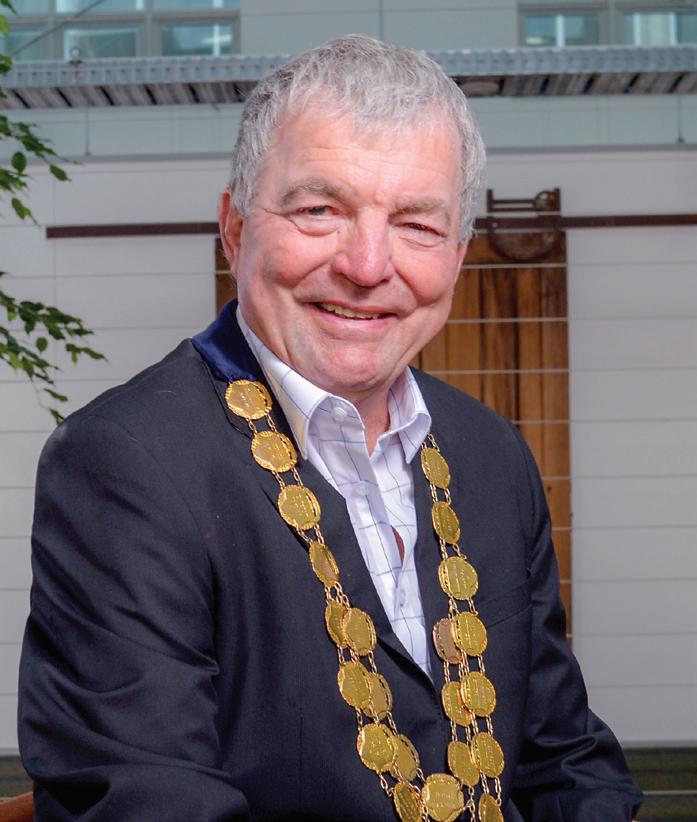
develop the proposed plan, it is time for the community to have their say.
“You will see we are again asking for your views on some key decisions about a Town Hall, our library, and improving infrastructure in our town centre. These projects were included in the last Long-Term Plan in 2021, but increasing costs mean we believe a change of tack is required.
“We’re also proposing some e ciencies now to reduce the rates impact and have a range of reviews planned to ensure services are meeting our community’s needs and being delivered in the most e cient way.”

Three options for...
The Town Hall
Three options are proposed for the Town Hall building, found to be earthquake-prone in 2016: The Council’s Preferred Option – Demolish the Town Hall and Municipal Buildings and build a new Town Hall on the current Town Hall site, retain the Municipal Building façade, and expand Waiata House. Cost: $42.6 million.
Alternative Option 1 – Demolish the Town Hall and build a new Town Hall on the site; retain and refurbish the existing Municipal Building including façade; and retain Waiata House. Cost: $49.9 million (noting high risk and uncertainty around costs and feasibility).
The Council’s Preferred Option and Alternative Option 1 include provision and budget to retain the Municipal Building façade. The estimated cost to do this is $1.97 million.
The library and archive
The Masterton District Library building is currently no longer fit for purpose, and also has a range of maintenance issues that need to be addressed, including water damage, mould, and a leaking roof. The Council’s Preferred Option –Upgrade and expand the Library and consider in future a further extension to include the Archive. Cost: $10.75 million.
It’s your place. It’s your Plan. Have your say!

Alternative Option 2 – Demolish the Town Hall and Municipal Building and do not replace these buildings; retain Waiata House and the leased Queen Street o ce. Cost: $3.57 million. The 2021-31 Long-Term Plan included plans to refurbish Masterton’s town centre while carrying out essential work on the underground water main.
Alternative Option 1 – Upgrade and expand the Library and include the Archive now. Cost: $14.66 million.
Alternative Option 2 – Complete essential Library repairs and maintenance only. Cost: $2.3 million.
Town centre improvements
Costs to deliver the Town Centre Revamp project have escalated significantly since 2021, and the Council thinks this is no longer a ordable for our community at this time. But the essential infrastructure work still needs to be done.
The Council’s Preferred Option –Complete essential work to improve water and roading infrastructure in the town centre. There would be no other improvements to Queen Street. Cost: $6.48 million
Alternative Option – Complete essential work to renew water and roading infrastructure in the town centre, and redevelop the town centre to improve to ‘look and feel’ of that space. Cost: $14.12 million.
But wait, there’s more...
The Council is also proposing making funding for community groups and organisations contestable, and the following changes to services:
y reduce Wairarapa Economic Development (WEDS) funding
y cease funding for regional Walking and Cycling facilitation
y cease funding for regional Positive Ageing facilitation
y seek further external funding for Welcoming Communities facilitation beyond 2025
y increase the Community-Led Climate Initiatives Fund rather than funding Climate Activation facilitation beyond April 2026.
Stories and veg changing spaces
A colourful al fresco library and a thriving community-supported agriculture farm are in the running for national awards – for revitalising previously unused spaces and uplifting communities in the process.
Martinborough’s StoryWalk® and Vagabond Vege in Greytown made the shortlist for the 2024 Kūmara Awards, organised by Placemaking Aotearoa. The awards, held since 2020 and presented in the Auckland, Wellington and Canterbury regions, recognise groups and individuals that have helped transform public spaces and, in doing so, made “a positive difference” to their hometowns.
StoryWalk®, a guided walkway in Considine Park featuring pages from children’s books on weatherproof boards, was nominated in the Beyond the Brief category – recognising physical spaces that are “more than what is expected or required”.
Vagabond Vege is a finalist in the Caring for the Land, Caring for the


People category: Its team nominated for converting a paddock full of rocks into a “vegetable paradise”, feeding more than 70 Wairarapa families. The awards, across five categories, will be presented at a ceremony in Wellington tomorrow evening.
Martinborough community activator Charlotte Harding, who had been involved with StoryWalk® since its inception as part of the Friends of Martinborough Library, said she was “really chuffed” the project made the shortlist.
“I think StoryWalk® epitomises what placemaking is all about: A really simple concept,
set up in a beautiful green space [the tree-lined path around Considine Park] that hasn’t been used as often, which has had a big impact,” Harding said.
“It’s been so successful – children and families are visiting pretty much every weekend, and then going out and buying the books, or borrowing them from the library. It’s just beautiful.”
Harding said StoryWalk®, a partnership between Wairarapa Library Service, Martinborough Men’s Shed, and South Wairarapa District Council, has also been a great way to showcase works by Martinborough authors and illustrators:

Such as Mr Phelps’ Fish
Becs Reilly. StoryWalk® also displays books to celebrate moments of national significance, such as Anzac Day, Matariki, and Te Wiki o Te Reo Māori.
“We’re really hoping we can support our local libraries to have a storywalk in each Wairarapa town,” Harding said.
Vagabond Vege was launched in 2022 by
friends
Laere, and grows a vide variety of vegetable crops – from carrots, to beetroot, to kale and broccoli – using no-till, chemical-free practices. Co-founder Wanklyn said she had barely had time to think about the Kūmara Awards, as the team had been “pretty slammed” in preparation for its winter growing season. Nevertheless, she was thrilled by how the community has embraced Vagabond Vege and its
bounty of produce. “It’s pretty awesome. It’s been a real privilege to provide something that’s such a necessity to so many families,” Wanklyn said.
“To be able to care for the whenua, and to bring local people vegetables that are full of nutrition, has brought us immense satisfaction.”
• For more information about the Kūmara Awards, go to https:// www.placemaking.nz/ the-kumara-awards.




GardenYarn with GardenBarn






Autumn is Camellia season, so it’s time to come and choose from our wonderful range, grown right here by us!
Camellias are easy to grow and very versatile, they’re popular as hedges, in pots, ‘sinensis’ is grown for tea, and they even encourage birds, bees & bene cial bugs into the garden.
What to Plant
When choosing you may see there are Sasanquas & Japonicas, or even Reticulata or Hybrid. They all have their differences:
SASANQUAS: These are very hardy, have early free-blooms from as early as March until August, are reliable and very versatile – ideal for specimens, screens, ground or bank cover, espalier, or containers. Sasanqua owers are usually quite small, often single and produced in such profusion it is sometimes dif cult to see the foliage. Many have a soft delicate fragrance. The leaves are small, dainty and quite pointed.
JAPONICA: These are also hardy with lovely foliage and if well maintained can provide blooms for up to 6 months of the year. Flower sizes vary from miniatures under 5cm across up to large 20cm semi-doubles.
RETICULATA: These have large owers, with some blooms attaining a width of 24cm. They have quite an upright growth habit and an open framework of branches and foliage. The leaves are very large, glossy and leathery.
HYBRID: These have a particular combination with the best attributes of japonica, sasanqua and reticulata. They provide the modern gardener with exquisite ower, form,











foliage and often a hint of fragrance. Many new releases in the Camellia world are hybrids, some of which have been bred right here in New Zealand.
Where to plant
A semi shade spot, possibly on the south-west side or under trees in dappled shade will suit most camellias, but it pays to check speci c varieties where possible. They will grow in full sun, especially sasanqua varieties, but would prefer shelter from strong winds and harsh sun.

Soil



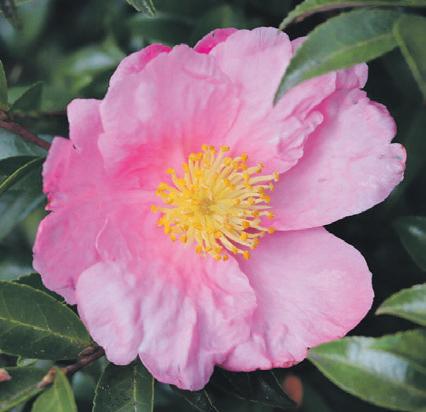
Camellias prefer acidic soil that is well draining and rich in organic matter. If you’re planting in the ground dig in some Daltons Acid Mix, ican Real Blood & Bone and sheep pellets.
Hardy Hedge
The year round glossy foliage and ease to grow make Camellias ideal for hedging and you can choose between shades of red, pink & white with Yuletide, Setsugekka & the Paradise range.

BRING IN THE BIRDS WITH CAMELLIAS in containers


Some camellias grow well in containers grown in Daltons Acid Mix, but take care with watering and ensuring they get enough nutrients. We recommend ican 24 Plus Slow Food for all container and garden plantings.




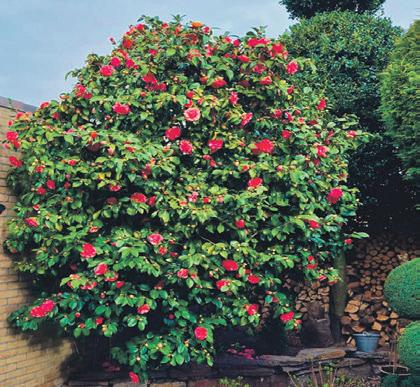







Carterton
April heralds new autumn plant fair
“A little slice of paradise” will be one of four gardens participating in the inaugural Great Gladstone Plant Fair this month.
Renée McKeany and Kevin Nation of The Summit Lodge off Admiral Rd have joined their greenfingered neighbours – Bron Wood of Bloomwood Flower Design, Danny Todd of Parkvale Gardens, and Luke Gardner of Longbush Cottage [known as The Gardening Collective] – to bring a new autumn garden experience to the region.
McKeany and Nation are relatively new to Wairarapa – and gardening – having moved from Hamilton to their five-acre property just 18 months ago.
“We really thought we were city folk and not really gardeners,” McKeany said.
“I think Kevin mowed the lawns twice in 20 years when we lived in Waikato. But now he’s got a ride-on mower he’s quite handy in the garden.”
With the help “of the collective hive mind” – particularly Gardner [whose property was recently awarded four stars by New Zealand Gardens Trust] – and online gardening resources, McKeany’s confidence and

skill base are growing, as is her and Nation’s sense of connectedness to their new home.
“We wouldn’t look back. It’s the best move we’ve ever made. The sense of community in Gladstone is something that I haven’t had since I was a child,” McKeany said.
nurseries alongside other complementary items and refreshments.
McKeany’s focus will be the sale of native seedlings and perennial plants from her garden, and a range of plants supplied by Wainuioru School and Community Nursery.
wheelmaking skills.
“We want to show visitors what’s possible through four diverse garden styles, without travelling far, and offer an opportunity to buy plants from each garden. There’s nothing like seeing plants in a garden setting to spark inspiration,” Gardner said.
• The Great Gladstone Plant Fair will go ahead, rain or shine, on Saturday, April 13, from 10 am to 4pm. It is a self-drive event. Tickets are $35, plus booking fees, and are available from iTicket and iSites. A ticket provides entry into all four gardens and their nurseries. Lucy
The four Great Gladstone Plant Fair properties will each have plants for sale from their garden

The Levitate coffee cart will also be on hand, and neighbour [and former Carterton mayor] Greg Lang will showcase his

“All gardens will have plants grown on-site, including a specialist perennial nursery opening
for the first time. All plants have been grown for Wairarapa conditions.”



Have Your Say on our Long Term Plan
Carterton District Council opens consultation on its Long-Term Plan [LTP] 202434 Consultation Document
The LTP sets out what the Council plans to do over the next decade and how it will be paid for. It includes our proposed activities, services, and project delivery, and projected rates for the next 10 years.
We are seeking public feedback on two consultation items:
Investing more funding in our roading network to prevent deterioration and potential closure.
Investment in the wastewater plant equipment upgrades at the old plant on Dale eld Road. The facilities need signi cant upgrades and are close to the end of their useful life.
HOW TO HAVE YOUR SAY
Visit www.cdc.govt.nz/ haveyoursay to complete our online form or download our consultation document.
Drop a document to us at 28 Holloway Street, Carterton
Post a submission form to P.O. Box 9 Carterton 5743
Email: submissions@cdc.govt.nz
Visit our kiosk at Carterton Events Centre.
Meet our elected representatives at one of our pop-up events around Carterton.
A copy of the consultation document is available inside this edition of Wairarapa Midweek.
POP-UP EVENTS
• Monday 8 April, 6am to 7:30am, Commuters Catch-up Carterton Train Station
• Wednesday 10 April, 6am to 7:30am, Commuters Catch-up, Carterton Train Station
• Friday 12 April, 5pm to 6pm, Carrington Park
• Saturday 13 April, 11am to Midday, Korero at the Events Centre
• Thursday 18 April, 11am to Midday, Cuppa at the Courthouse
• Saturday 20 April, Midday to 1.30pm, Catch us at the Colour Run

The at part of Flat Point being the reef that allows a smoother exit. So, the place name in Māori and English agree.
Charles Rooking Carter Awards Nominations Now Open until 22 April
The Carterton District Council’s Charles Rooking Carter Awards is a triennial awards ceremony to publicly acknowledge and celebrate the volunteer work, business innovation and achievements of members within our community. Nominees in every category must have carried out their contributions in Carterton.
AWARDS CATEGORIES
Volunteer Service Awardrecognises the important role of volunteers whose service positively impacts the Carterton Community. This award could go to either an individual or a community group.
Entrepreneurship Award - Recognising an individual, organisation or project which is trying something new and
innovative to solve a problem which is having an impact on the Carterton District.
Business Award - Rewarding a business which has demonstrated exceptional commitment, excellence, and innovation in creating a positive and supportive work environment for its employees.
Environmental & Sustainability Award - Recognising an

Make The Switch To Objective Build

We’re moving the Objective Build Portal for lodging building consent applications. This will align Carterton with Masterton and South Wairarapa District Councils, providing a consistent approach across Wairarapa’s Districts.
individual, organisation or project which makes an outstanding contribution to improving Carterton’s environment and sustainability.
Youth Award - recognises and celebrates the passion, success and commitment of rangatahi (aged 12 to 24 years), who are leading change, innovating and creating solutions throughout Carterton. This could be in any
eld and in a voluntary or other capacity.
Supreme Award – Overall winner
All nominations must be received by email to communityevents@ cdc.govt.nz, online or in person to the Carterton Events Centre by 5pm Monday April 22, 2024. The Awards Dinner is Saturday, 22 June.
Winter is Coming! Enter Our Competition And Stay Warm!
With cold weather knocking incredibly early on our doorstep, Carterton District Council want to make sure that you’re ready to settle into the chilly season.
Enter our competition, and be in to win rewood, or a handy gadget to keep your home healthy!
Head to cdc.govt.nz/ healthy-homes to nd out





TO ENTER:
• Visit our website, or pick up a form from Council O ces.
• 28 Holloway Street or post it to PO Box 9, Carterton, 5743.
• Full terms and conditions available at www.cdc.govt. nz/healthy-homes
• By entering the draw, you con rm you have read and agree to the terms and








Battle of the Balances
I’ve heard a lot about “balance” lately, most recently from the Chrisosphere – aka Chris Luxon and Chris Bishop – on the economy and environment respectively.
Last week, Luxon told the New Zealand Herald, “The critical thing is the Budget, and getting the balance right. We want to find the balance, actually – balancing wasteful spending so that we can protect front-line services, [while providing] tax relief and growing the economy.”
Turning to the environment, Bishop strongly suggested to RNZ’s Lisa Owen that Department of Conservation land could be opened up for mining under the Fast Track Approvals Bill. He said, “One of the pieces of feedback that we get from people involved with infrastructure... is that sometimes conditions imposed by [decisionmaking] panels are too onerous and don’t strike the right balance between economic development and protecting the environment.”
The scoop with Coops
Lucy CooperBoth invocations of “balance” left me feeling uneasy. “Hang on,” I thought. “That doesn’t sound like balance. More like.... trade-offs.”
Maybe I’ve got the wrong end of the word stick?
So, I reached for my Collins English Dictionary and Thesaurus [“all the words you need, every day”], and leafed through the B words. Bagpipes, baffle, baggage, balalaika... balance.
And “balance” is a slippery word! I can see why politicians are so partial to it.
It dawned on me: When the Chrises invoke “balance”, they don’t mean “a state in which a weight or amount is evenly distributed” or “to bring into harmony or proportion”.
They mean “to consider and compare”. More likely,

“to weigh against one another”.
Let’s take the environment first.
The rhetoric around the Fast Track Approvals Bill has been robust, tough even. With its onestop-shop approach for major infrastructure and development projects, it will “cut through the thicket of red and green tape holding New Zealand back, make it clear to the world that we are open for business”.
But don’t worry, folks – it’ll be a balanced slashing because this “new regime will unlock the construction of major infrastructure projects in this country while still ensuring the protection of our environment and existing Treaty settlements”.
My friend Tom had some thoughts about this reductive and binary approach.
The whole argument of “striking the right balance” between the economy and the environment “misses the point that actually the lines that we’ve drawn in the sand are already well past balance”, said Tom.
“We’ve lost 90 per cent of our wetlands across the country. So, where is the point of balance? Was it back when 50 per cent of our wetlands was lost?”
You can play along at home: Replace “wetland” with any other natural resource or value of your choice.
I’ve run Tom’s Game against disability funding, an issue I suspect is “well past the point of balance” and recently subject to governmental “rebalancing” exercises.
When Whaikaha, the Ministry for Disabled People, unveiled changes to purchasing rules for disabled Kiwis’ equipment and support services, there was uproar. The changes came out of the blue with immediate effect and without consultation.
Disability Issues
Minister, Penny Simmonds described the funding changes as a “recalibration” exercise –an attempt to “find some middle ground about what is reasonable”.
A [re]-balancing, if you will.
The thing is, Whaikaha, and the people and whānau it is designed to support, are already “well past balance”. It’s been underfunded “from day one”, Disability Support Network chief executive Peter Reynolds told RNZ.
Chris Higgins, chief executive of Rare Disorders NZ said, “New Zealand already has a poor record when it comes to accessibility for disabled people. Further limiting their choices and opportunities is beyond comprehension.”
Where is “balance” for disabled people? Is it when Whaikaha is properly funded? Is it when people with disabilities are treated with dignity and respect? Well, as Tom would say, it seems we are well past that.
You can play Tom’s Game whenever somebody in power says they want to “get the balance right”. I’m currently playing it on the topic of Māori wards.
The rules are simple:
First, identify the degree of imbalance that currently exists for a community. Then, put yourself in their shoes. Finally, ask yourself –does this look like balance now?


FIVE MINUTES WITH ...
When I was a kid, I was really into… Star Wars.
My favourite thing to do on a rainy day is… Cook and read.
My favourite authors are… David Mitchell, Annie Proulx, and Stephen Graham Jones.
The thing I love about horror fiction is… Its ability to get under your skin, and tickle and yank your nerve endings.
The scariest book I’ve ever read is…
Pet Semetary, by Stephen King. I read it as a teen, but reading it again as a parent is harrowing.
A useful remedy for writer’s block is…
Rewriting and revising what you have so far. Also reading, watching films, listening to music – getting inspired by other art.
The best piece of advice I’ve ever received is…
Write what you know. It took me a while to heed that advice but, once you do, you realise there are multitudes of stories, characters and events that can be mined from your own experiences.
The most amazing place I have ever visited is… India.
I’d love more time to… Write, write, write!
MIDWEEK PHOTOS

CONTACT US

You may share your opinion in print and online. To comment online, message our Facebook page and feel free to comment on any of the stories. Please email letters to midweek@age.co.nz or post to Wairarapa Midweek letters, P.O. Box 445, Masterton. Include name, address, and phone number. Noms de plume are not accepted. Letter writers’ town of origin will be published with the letter. Letters should be no more than 250 words, and may be edited for space and clarity.






Have you got a photo you want to share with Wairarapa?
Whether it’s a reader photo, a cutie, or a snap of you with your Midweek, email it to midweek@age.co.nz with ‘Midweek Photo’ in the subject line, and it could be featured in this segment.
CUTIE OF THE WEEK

Reader Steph sent in this beautiful photo of daughter Riley Nella Peterson – who celebrated her first birthday last month. Steph says Riley “loves posing for the camera, cuddling her teddies, exploring everything, and a having a good swing at the park”. Happy belated birthday, sweetheart! PHOTO/STEPH CHEER








Extra
CONSERVATION
Wai is a taonga
Rangitāne o Wairarapa Inc. Tina te pū [environmental team]
When we talk about water, the first thing we always start with is where we descend from.
Our stories as Rangitāne o Wairarapa Inc. talk to how we are descendants of Ranginui and Papatūānuku. From them comes their mokopuna, Parawhenuamea – for us she is personification of freshwater.
While our stories may seem like fairytales to some, they are embedded with 1000-year-old observations our whānau, hapū and iwi
have seen on this land. Stories passed down from generation to generation on how to adapt and learn from our environment.
One of these stories is the cycle of water as we know today. Wai [water] is a taonga to us. All life comes from water, and it is only through water that life can survive. When our water is sick and suffering, we as a people will suffer. Our people are farmers, horticulturalists, gardeners. We are part of the community. Our work that we do in our office at Rangitāne o Wairarapa Inc. is to look at the intergenerational

impacts of projects people want to do today. Our job is to dig into the details of these projects that promise everything, but may deliver little for the people. We see large scale water projects as one of those.
The impacts of taking massive amounts of water upstream mean little water will flow through the ecosystem, which is much needed for the likes of Lake Ōnoke, estuaries and coastal waters. The more we take, consume and
A kākāriki takeover at Pūkaha
Pūkaha National Wildlife Centre is a captive breeding centre nestled just north of Masterton.
This sanctuary has become a stronghold for the conservation of Aotearoa’s native birds, with its latest success being the yellow-crowned kākāriki breeding


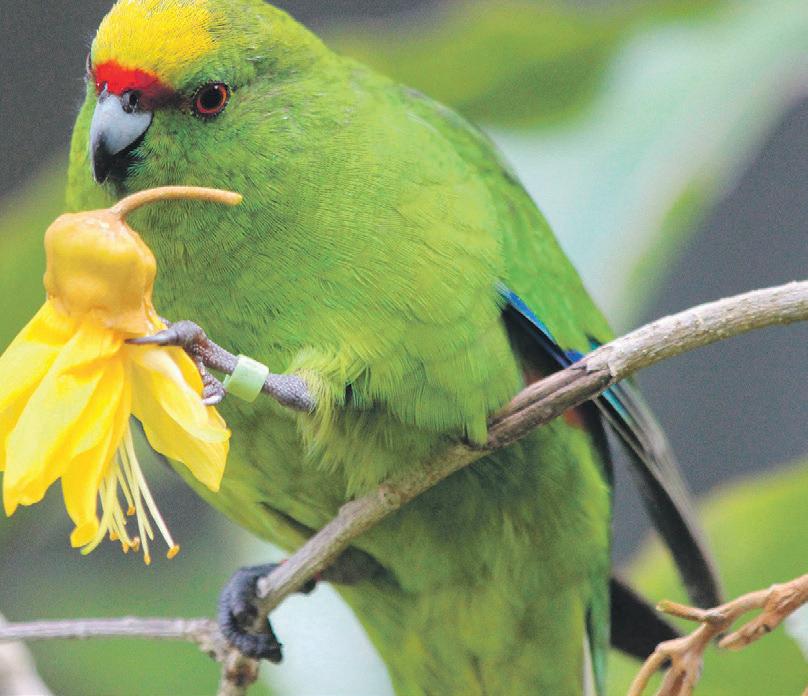
discard as waste, the less that flows through the system, and the more time it takes to regenerate.
Native-based and innovative solutions are what we absolutely need. If they can grow food in the middle of Sahara Desert with indigenous technologies to capture water, then we could be utilising these techniques to help produce and consume food in Wairarapa. We need to ensure that we can sustain and support our
being released include both this and last year’s chicks, in addition to an older breeding pair. This achievement is further amplified by the arrival of an additional 38 kākāriki from sanctuaries across New Zealand, which will help with genetic diversity and strengthening the species’ resilience.
These 56 birds will join 36 wild kākāriki that rangers released last season at Pūkaha, and will hopefully breed this coming

people to grow kai. We already have commercial entities looking at water recycling, moving to net zero water organisations, and how we can reduce the water consumption within our region.
Future generations are going to be left a giant bill for the detrimental impacts of our actions. Our job is to support Papatūānuku to heal herself, and reduce the impact on our future generations as much as possible so they can thrive.
and, with continued growth in the population, Pūkaha hopes these birds will soon find new territories to thrive, spreading their wings across the region.
The success of Pūkaha’s kākāriki breeding programme serves as a beacon of hope for conservation efforts nationwide. It outlines the importance of creating safe havens for endangered species and fostering partnerships to ensure their long-term survival.

Driving Miss Daisy is NZ's number 1 friendly and reliable companion driving service. We can drive and accompany you to:
•Medical and other appointments
•Companionship outings
•Grocery or other Shopping trips
•Family / social occasions
•Take your pets to the vet
•Scenic drives
Total Mobility Scheme clients receive a subsidy increase to 75%. ACC contracted supplier.
To make a booking call Christian:
If you have an injury that is covered under ACC, you can request to use our reliable service for your injury-related transport. We claim directly from ACC. Please contact the ACC contact centre on 0800 222 435 ext 12 to obtain pre-approval.
Available 7 days a week - Pre-booking essential, especially for weekends.
Email: wairarapa@drivingmissdaisy.co.nz www.drivingmissdaisy.co.nz











Lifestyle


 Becky Bateman
Becky Bateman
In 1963, Wairarapa gallery supporters took the ambitious step of buying a Barbara Hepworth sculpture as the foundation piece for a new arts and cultural centre. Since then, Aratoi’s collection has grown to over 3500 items.
Today, our Collection Policy states Aratoi will hold “collections in art, taonga Māori, natural and social history with a particular emphasis on the Wairarapa region of New Zealand”. Jo Torr, collection curator, is responsible for researching any proposed additions to the Aratoi Collection. She takes her proposal to the Acquisitions Committee, made up of Sarah McClintock [Aratoi’s director], two Aratoi board members, an outside expert, and Torr herself. Aratoi








iwi representatives are consulted for any taonga being proposed, in accordance with the Taonga Māori Policy.
“Most acquisitions are gifts to Aratoi from very generous donors,’’ Torr said. “Often, our new acquisitions come from people when they are clearing out their family home. Very occasionally, we purchase an item from our small acquisitions budget if we spot something really special.”
Once accepted, the item joins the collection, is valued for insurance purposes, and registered on the new collection information management system.
Not everything is accepted: The item must fit the kaupapa set out in the policy documents.
One of the latest additions is a travelling writing box/document case that once belonged to the Hon Alexander Wilson Hogg [1841-
1920] and was bought from Dunbar Sloane’s auction house.
Alexander Wilson Hogg was born in Glasgow, Scotland.
In 1876, he arrived in New Zealand and worked as a journalist for various South Island newspapers.

In 1884, Hogg and his family moved to Masterton, where he initially worked for the Wairarapa Star as part-owner and editor. He was a leading spokesperson for the working class and small settler interests. He served on numerous local bodies and was passionate about education for all.
Hogg represented the Masterton electorate in the New Zealand House of Representatives for 21
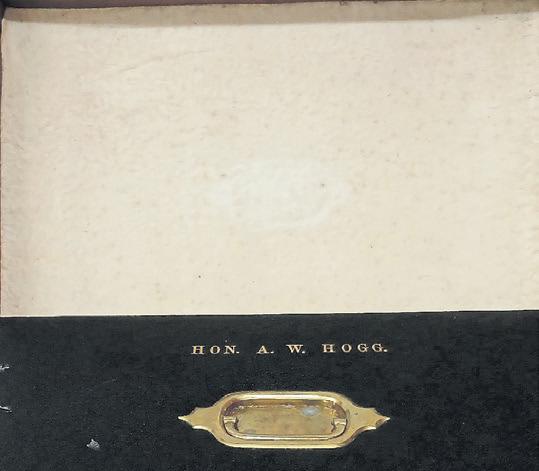
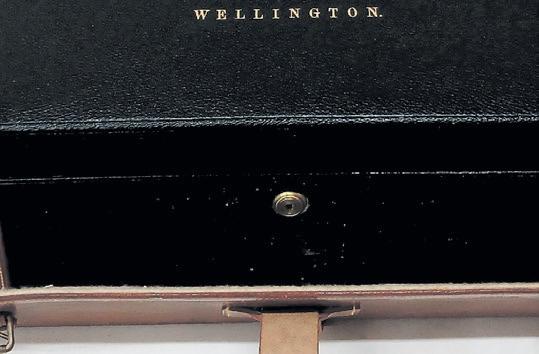


years from 1890 to 1911, gaining a reputation as a champion for the working population.
The quality of his document case appealed to Aratoi as a potential object to collect, as Hogg would have used it during his time as a Member of Parliament. Hogg was a significant Wairarapa personality at a very interesting




time in New Zealand history – the formation of party politics, women’s suffrage and the long Depression. Hogg Cres in Masterton was named after him. Thanks to those farsighted benefactors of 1963 and the generosity of many others, Aratoi’s collection has morphed into the one we have today.













10–12 MAY
THE SECRETS OF LIVING WELL WHILE
LIVING LONG
Saturday 3.30pm–5pm, Kiwi Hall, $25










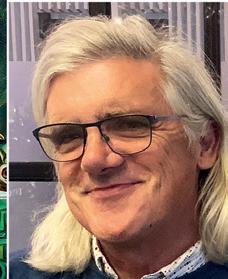
THE GOOD LIFE: Totting up years, accruing wisdom, racking up steps and stockpiling books.
THE WISDOM YEARS BY JOY COWLEY
OFF FOR A WALK
Saturday 4pm–5pm Featherston School Hall, $20
THE DILEMMA OF A BIBLIOPHILE
Rachel McAlpine’s hit play e Secret Lives of Extremely Old People is part of her mission to nd out all she can about old age. She and Robin Payne, who directed Secret Lives, and Gary Young, who played 90-year-old Gilbert, will discuss and perform some of the stories at the heart of the play, and Rachel (84) will give a taster of her new show, Unyoung e session will wrap with tips and tools to help older people live well. For anyone 40–100 years. Bring your questions. MC Mary McCallum Generously sponsored by e Acorn Trust.

Saturday 9.30am–12.30pm Featherston School Hall, $60 Joy Cowley says the child in her will never die. In her life-a rming, lifechallenging workshop, she will take participants through the stages of life and what they mean, with a focus on what Joy calls “the wisdom years”, a time when “the body goes into labour to give birth to the soul”. For anyone 60+, led by one of our acclaimed writers and spiritual mystics.
Generously sponsored by Jen Bhati of Property Brokers Wairarapa.

“How can you see your life unless you leave it?” writes Catharina van Bohemen in Towards Compostela, her account of walking the Camino de Santiago. Dame Kerry Prendergast and Sue and Tim Pankhurst (Every E ng Inch) le their lives to walk the 3,012km Te Araroa Trail that runs the length of the country. Gregory O’Brien leads a conversation about the call to a walking adventure, the rewards and challenges.
Generously sponsored by Richard Stone and Dennis Roberts.


Sunday 11.30am–12.30pm
Kiwi Hall, $20
Book collecting is variously described as a passion, an obsession and even a disease. Bookselling the same. Bookseller Ruth Shaw (Bookshop Dogs) and book collector Tony Eyre ( e Book Collector) talk about the a iction/gi of bibliophilia, where it’s taken them in their lives and the dilemma of where to put all the books. Fellow bibliophile and Masterton bookseller David Hedley is in the chair.



Driving away with safety skills
Freddie Wilkie freddie.wilkie@age.co.nzYoung motorists from across the region have been empowered to make the right calls behind the wheel, following a seminar from local road safety experts.
Last month, Year 12 and 13 students from Wairarapa secondary schools attended the Rotary Youth Driver Awareness programme, held at Solway Showgrounds and facilitated by the Wairarapa Road Safety Council [WRSC] and Road Safety Education.
The annual two-day programme aims to support teen drivers to make safe and responsible choices on the road – covering topics such as distractions while driving, speed, driving conditions, safe following distances and general hazard awareness.
Bruce Pauling, WRSC manager, said it was “really important for kids to learn what to watch out for”, both as drivers and passengers.
“We know that, at some stage, they will be faced with situations where, unless they make the right decisions on the road, it could be fatal,” he said.
“When it comes to road safety, young people have more power than they think. Even as passengers, they can speak up.”




Pauling talked about his 30-year career as a police officer in the Serious Crash Unit.
“One of the worst things is having to talk to whānau [after an accident], and tell them they won’t be seeing one of their loved ones again,” he said. “I don’t want that to happen to our young people.”
Facilitator Holly Hullena, also from WRSC, talked to the students about
stopping distances and the importance of keeping a safe driving distance.
For example, if you are travelling 60kmh and you need to stop, you cover a
distance of 16.67 metres for each second it takes to stop the vehicle.
“The students looked at the safety ratings of cars to determine what is the right car for them,” she said.
“We also had sessions such as Mind Matters and SOS, which gets them thinking about their personality as drivers.”
Chanel College students Maddie Pennman and Charles Macan said they found the programme “helpful and insightful”.
“There are a lot of things that can distract us [on the road],” Maddie said.
Charles added: “It’s been really interesting gaining more awareness about the different qualities of the road that can affect the drive and how many risks there are that you need to pick up on.”
Also in attendance was Naomh Cusin from RSE, who flew up from Christchurch to host the event.
The programme is supported by Waka Kotahi NZ Transport Agency.
• Vonnella and Country Look shirts –Classic country checks and plains
• Cord Trousers –Country Look stretchable waistband.Navy, Olive, Tan, Taupe, Khaki

If you are experiencing troubling issues like anxiety, grief or depression, or if you’ve been affected by family violence, we can help. We offer a non-judgmental, respectful, caring space where we help people through their process of change. P: 06 3775716
E: admin@changewairarapa.org.nz www.changewairarapa.org.nz
























































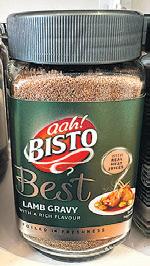











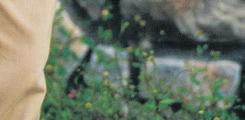









Thomas Cook - 5 pocket jean style moleskin (as illustrated) plus side pocket trouser style moleskin. 4 colour options available.

Do you want a rewarding volunteer role where you can make a difference to people’s lives? Would you like to work for an organisation that has given 50 years of advice to the Wairarapa public? We are proud of our history of service and feel we may have made a difference when people seek advice to surmount their problem. Do you think you can help people out in this way?

Consider volunteering for Citizens Advice Bureau – Te Pou Whakawhirinaki
o Aotearoa [CAB].
We have around 30 wonderful volunteers in our Masterton office, which covers the whole of Wairarapa. We work together to deliver our service of information, advice and support to people who contact us for help.
Clients can come to the CAB with an enquiry about anything. Some of the most frequent areas of enquiry include tenancy and rental
family matters and immigration. And if you are thinking, “I don’t know much about any of those issues” – don’t worry, we have the answers at hand.
We work with clients by listening carefully to their stories – we have amazing resources – and researching their rights and responsibilities and the services available to them. We explain the information so that our clients understand their options and make their own decisions. The feedback we get from our volunteers is that they find providing the CAB service rewarding and purposeful.
Most volunteers give about four hours every week to work as part of a team delivering the
clients on the phone, by email, or face to face when people visit the CAB office.
Volunteers often also help out with other aspects of running the bureau – for example in publicity, training, social media or governance. There are lots of opportunities to contribute existing skills, and develop new ones.
To make sure all volunteers are supported in their role, we provide a programme of learning and development. This includes an induction period and mentoring programme, as well as ongoing learning opportunities and peer support. A key area of learning, especially for new volunteers, is how to use the CAB website to
Our volunteers come from all walks of life and range in age. We are always happy to hear from anyone who is interested in finding out more about volunteering at the CAB.
Your local Citizens Advice Bureau is available from 9am4pm, Monday to Friday. We are a confidential service and we are free. Our volunteers have life experiences in many areas. We have two volunteers on each morning or afternoon shift, and we work together to give the best possible advice to those seeking direction toward solving their problems.
In Masterton, we also have a Justice of the Peace available on certain days. Please call first to see if they are in
• If you are considering volunteering at the CAB, please visit us to fill in our volunteer form. You are welcome to call for further information, and can also fill in the volunteer form online at https:// www.cab.org.nz/ volunteer
A rewarding opportunity at the CAB Lifestyle


























As the temperature drops outside, there’s nothing better than getting your home, winter ready, making it a healthy and comfortable place to be, during the challenging winter months.
Here’s some practical hints. Clean the gutters. Autumn leaves, dust and dirt from summer, can clog up the gutters causing all kinds of backlogs and blockages. While on the roof, check for leaks, cracks, and any other problems.
Tidy the garden. Make sure any overhanging branches are trimmed back from gutters and roof, and away from power cables. Trimming back bushes also helps maximise sunlight.
Check smoke alarms. Using heating appliances or log res during winter raises the risk of house res. Make sure the batteries in your smoke alarm are working properly. Double check the alarms are in the correct position within your home too. Fire and Emergency NZ have dedicated people who will visit your home and advise. It is recommended placing alarms within three metres of each bedroom door.
Stop gaps and draughts. Those pesky gaps that you barely noticed in warmer months can now make your home hard to heat. Use or replace draught stoppers around doors and windows. Weather strips, or clear sealant, from DIY shops, can close more signi cant gaps around doors and window frames. Cover your windows with thermal backed curtains.
Double glaze windows. Double glazed windows can reduce the chill




from outside and therefore save you money on heating inside. It also reduces condensation on windows, which means goodbye to mildew/mould.
Heating. Clean lters in heat pumps. Check dehumidi ers are working to their best ability. Clean your chimney for log res. It’s best to keep your home at a consistent 18-20 degrees rather than blasting in heat for a few hours. This can create condensation and mould growth. It’s also more cost e ective to maintain a constant air temperature since it uses more energy to get cold air back up to a comfortable temperature.
Sort emergency supplies. Check your household emergency kit is fully stocked and up to date. If you don’t have one –create one. Winter can bring unexpected storms and power outages. You need a torch, battery-powered



radio, spare batteries, rst aid kit and essential medicines and enough food and water for family members in the household for at least three days.
Consider getting a generator. A small inverter style generator can be an essential item to keep your freezer on when the lights go out. The price of running the generator is peanuts compared to what you will save in spoilt food. Make sure you run it outside, under shelter – and with no connections exposed to the elements.
Flush hot water tank. Flushing your hot water tank will remove sediment and help lengthen the tank’s life. You can insulate older tanks by wrapping a thick, purpose-made blanket around it –found at most hardware stores. This will help prevent heat loss, conserve energy, and save you money.


Get ready FOR Capsulise your clothes for cooler times




Not all of us are lucky enough to have huge expansive wardrobes where our year-round clothes can languish happily.
with secure lids instead of cardboard boxes for seasonal clothes storage. Be sure to label them to make nding things easier. Even thicker cardboard boxes will eventually fall apart and they’re harder to move around.
pieces if your o ce dress code leans more traditional, than casual. Here’s a list of basics to consider:
Wool Coat – a classic wool coat will take you anywhere.



As the temperatures outside start cooling, it’s a good idea to take out clothes you won’t be wearing and sort them for next summer. Seek out your boots, hats, gloves, jerseys and coats, and those warmer clothes which are lovely to wear in winter.
So, to make room, exit your tee-shirts, linen tops, summer dresses and favourite sandals.
Plastic Storage containers are a great way to store summer clothes. Always use clean plastic storage containers/bins

One of fashion’s smartest concepts is the capsule wardrobe, which is simply a highly curated selection of garments that you can easily mix and match. This pertains to both men and women. Creating a winter capsule wardrobe will not only help you save money and wardrobe space, but it’ll also streamline your winter out t planning. To build a winter capsule wardrobe, start by taking stock of what you already own. Identify your favourite winter pieces and consider your lifestyle and needs when deciding which other items to keep. For example, you’ll want to keep smarter

Pu er Jacket. While a classic wool coat is chic, some moments call for a layer that’s a bit more casual
Scarves
Jumpers
Layering Shirts
Warm under layers/singlets
trousers Boots Hats Casualwear for hanging out at home.
Camping in the outdoors over winter
A tent, warm clothing, and a quality sleeping bag. They are the basics if you want to take in the outdoors during the winter months. Most importantly, you’ll want dry clothing layers and next-to-skin thermals to change into after setting up camp. Having your sweat dry out on you in freezing conditions is far from pleasant, and sucks heat out of your body.
In cold conditions blood ow gets concentrated around our vital organs to keep them working properly and to keep the core body temperature up. Our extremities (toes and ngers) may lose circulation and become susceptible to frostbite. Warm gloves and boots are especially important. Have fun!





Takurua (Winter) is approaching. Whaiora encourages whānau to reach out for support with hauora wellness and illness prevention.
Contact your GP service to organise your vaccinations and help prevent the spread and severity of Measles, Meningococcal, Whooping cough, Covid-19,






Save money and help save the planet along the way
There are many environmentally friendly ways to save money and keep your home e cient, especially in the cooler months.
Install eco-friendly bulbs. These bulbs can last for years, and they use 80% less power than standard light bulbs.
An energy e cient shower-head can use up to 50% less hot water than a standard one. Consider installing one yourself or ask your landlord if one can be tted.
Check the seals on your fridge to make sure they are still working. If they stop working or become less e ective, warm air will enter your fridge, making it work harder and use more power. To test your




seals, put a piece of paper in the door and close it. If the paper can be easily pulled out, you may need to have the seals replaced. Do the same with your oven, as it could be losing precious heat energy whenever you cook.
Double glazing on windows is an e ective way of controlling heat loss and condensation but can be very costly. A cheaper alternative is to buy a window insulator kit, which involves tting plastic lm to the inside of wooden windows. This can be done easily and will make your windows 90% more energy e cient.
If you are replacing an appliance, try to ensure the replacement appliance is as energy e cient as possible. The higher initial cost will bene t you overall through savings made to your power bills.





Get ready FOR Thinking of our stomachs




Winter eating is all about comfort food which feeds our bodies in a way which keeps us warm and healthy.



Huddling in front of the re or heater on a wet and windy night is the perfect chance for planning healthy nutritious meals. You can help boost the immune system through good food and exercise, and better your chances of ghting o those winter ills.
The NZ Nutrition Foundation provides great advice. Here are its top tips for winter eating:
Eat Plenty of Fruit and Vegetables. Top up your immune system by eating antioxidant-containing fruit and vegetables. Choose fruits and vegetables that are in season such as mandarins, apples, grapefruit, broccoli, brussel sprouts, carrots, cauli ower and potatoes. Get your 5+aday by making at least one fruit or vegetable a part of every meal and snack.
Make a Casserole. With a casserole you can use economical cuts of meat (blade steak, chuck steak, chops) with slow cooking methods. Red meat is high in zinc and iron, two minerals that boost the immune system. Legumes (chickpeas, kidney beans, soybeans) are an excellent protein source, low fat, high bre, low GI and economical. A casserole with meat, vegetables and a can of






beans is a great way to boost your ability to ght disease, as well as being real comfort food.
Enjoy Soup. Soup doesn’t have to be complicated as there are many good soup mixes available to use as a base. With lots of vegetables, beans, or lentils and maybe meat, soup is the perfect food to build your immune system. Chicken soup is especially famous for this.
Watch portion sizes. It is very tempting to snack on foods, eat a large plate of food and even have seconds, when you are indoors all evening. To avoid eating too much, try to eat your meals at the table with the family, turn o the TV, use smaller plates, and reserve half your dinner plate for vegetables.
Drink Plenty. Always important whatever the weather.

























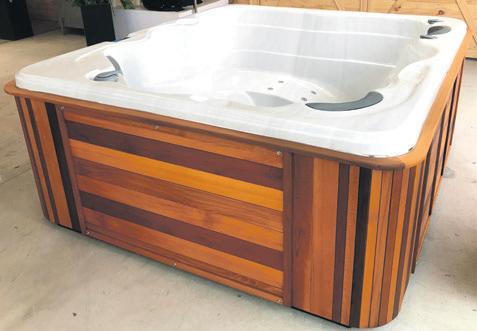


Include Garlic. Garlic is a great disease ghter as well as adding avour to food. Garlic will give the most bene t to your immune system when chopped and then left to stand for 10-15 minutes before adding to the pan. If garlic is cooked straight after it’s chopped, you are not getting the full health bene t. Choose foods containing Vitamin D. Sometimes called the ‘sunshine vitamin,’ it has been shown to help support the immune system. In winter when the weather is often bad, and the angle of the sun is low, it is possible we are not getting enough vitamin D from exposure to the sun. In this case, food becomes the most important source of vitamin D. Oily sh like salmon, mackerel and sardines are good sources of vitamin D and there are also vitamin D forti ed milk and yoghurt available.
Keep moving. Find an indoor sport or exercise class, rug up, and brave the elements for a walk and arrange to meet a friend so that you must turn up. Try increasing the amount of incidental exercise you do by taking the stairs instead of the lift or walking and talking instead of emailing a nearby colleague.



The value of a sauna




Don’t let the cold and sullen mood of winter catch up with you. Taking a sauna is the latest popular buzz activity and it’s catching on fast. Why?
Because:
1 The heat reaches deep into your body muscles to warm your system making the weather at least bearable.


2 Flu, stu y nose, sore throat, and numbness, among other are common winter ailments, tone down with frequent sauna visits.
3 Sweating is the best way to detoxify and cleanse the body.
4 A good session at the sauna boosts your cell activity and brings you a deep good night’s sleep.
5 Chilly weather makes our bodies lose moisture and leaves our skin dry and vulnerable.
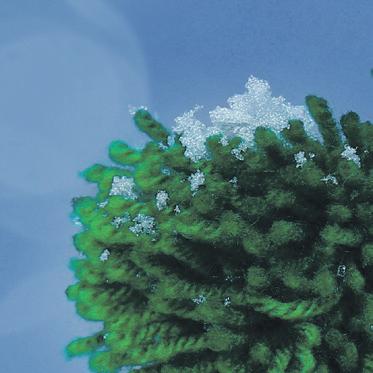


6 Chapped lips and dry palms are not a good look. A sauna reconstructs the skin and moisturizes it to restore its glow.
7 Sometimes we get so lost in working and performing our daily lives that we forget to take care of ourselves.
A visit to the sauna gives the chance to spoil yourself and feel invigorated before getting back to reconnect with the busy world.


















HOW HEALTHY IS YOUR HOME?
You can now borrow a home-health self-assessment kit from your library to check the health of your home.
It’s simple to use and the results might surprise you.

Available free to all library members.




Get ready FOR Pesky pests
best dealt with before winter sets in Cockroaches love hitch-hiking indoors on your rewood, mice and rats love nesting in your walls and chewing on the odd wire, ants love messy food areas where food is aplenty, and let’s not think about bed bugs!
So, enter pest control – whether it’s DIY or you get in the experts, it’s good to have action – and it is vital for a healthy life. There are many agencies experienced in keeping your home pestfree, especially important in winter when you are inside more.
Pest control methods protects against insects that can create public health problems and costly property damage. Furthermore, some pests, such as ants, bed bugs, cockroaches, and rodents, can survive throughout every season and remain in businesses and homes all year round. Creepy thought?
So, what to do? Check out what products are available to do the job

yourself or ask around for reputable pest control companies.
Openings and cracks are a great entry point for pests into your home. Try and block their access as much as you can. Install screen windows and doors or repair any already there.
Check roof spaces and repair cracks and damaged roof tiles. It’s important to keep up with outdoor maintenance like grass and bushes too near you house.
Compost should be kept away from the house just like rubbish bags. Firewood is a valuable commodity in winter, but it’s best stored at least ve metres away from the house. Moisture and dampness attract pests so try to restrict drying laundry inside the house. Easier said than done when it rains for a week, so if you must hang out your washing indoors, try and keep windows and doors open as much as possible to encourage good ventilation and stop mould growing.









Have your say
South Wairarapa District Council is consulting on our 2024-25 Enhanced Annual Plan. This will form the budget for the upcoming year and includes how rates are set.
This year’s proposed budget includes a total rate increase of 15.3% for the 2024-25 year. This continues a significant operational expenditure programme focused on core infrastructure needs, primarily in roading and water services.
To help Council determine what the next year looks like, we need your feedback on three specific consultation topics;
How much should we spend on operating and maintaining our water services?
How should we charge for water use?
How should we pay for the replacement of our assets?
KEY DATES
5 April 2024
Consultation opens
5 May 2024
Consultation closes
15 & 16 May 2024
Hearings
22 May 2024
Deliberations
26 June 2024
Adoption of Enhanced Annual Plan
www.swdc.govt.nz/ enhanced-annual-plan/
The details of these decisions can be found at www.swdc.govt.nz/ enhanced-annual-plan/
It’s important for South Wairarapa communities to have their say about the proposals in the consultation document. We want to hear from you about which proposals you support, and welcome comments on the other areas we’re focusing on. The online form is the quickest and easiest way to make a submission. We look forward to getting your responses, thoughts, and suggestions.

Please get your feedback to us by Sunday 5 May 2024
How to provide your feedback
Visit us at a community workshop
Join us at an upcoming community workshop, hosted by your elected members and Council staff. Workshop attendees will have the opportunity to join a conversation around each decision, along with time to ask additional questions.
Martinborough:
April 13 | 10.30am – 12pm
Martinborough Waihinga Centre
Featherston:
April 20 | 10.30am – 12pm
Featherston Community Centre
Let us visit you
Do you host community events or meetings?
We’d be happy to visit you and talk about the Enhanced Annual Plan and what it means for you and your group.
Email submissions@swdc.govt.nz or call 06 306 9611.
Complete a submission form
Anyone can make a submission online at www.swdc.govt.nz/enhanced-annual-plan/ or by completing a paper submission form. These can be printed off our website or picked up at the Martinborough Council office or any of our libraries, and returned to us via;
ͧ In person: drop into to any of our libraries or to Council office at 19 Kitchener Street, Martinborough
ͧ Post: PO Box 6, Martinborough 5741
ͧ Emailing: submissions@swdc.govt.nz
You can present your feedback verbally at a hearing (with or without making a written submission first) – in person or via technology (which can be a live or recorded statement).
Talk to an elected member
Get in touch with one of your local elected members. You can find their details on our website.
Lifestyle

Our friendly feathered friends

Comment – Pick ‘n Mix
Graeme Burnard
We have a very friendly fantail in our garden.
I call it Fiona, but it could be Frank. Hard to tell these days. We have always had very timid fantails around, but this one is particularly keen on human company. The moment we step out of the house, there she is –flitting around, very close up, chattering away like an old friend.
When I walk the 250 meters down to the letter box, she comes along –flying down through the olive trees, keeping me company. When I am in the garden, she is right there. Even when I go to the chook house, she comes with me and sits on the fence, watching what I am doing.
We had a couple of fantails come into the house last year for a quick visit. They would come in the back door, down the hall, through the kitchen and out the kitchen door onto the deck, without stopping. Just passing, one of them would call out.
Sometimes, they would venture into the lounge

and hang from the light fitting or stop at the mirror in the hallway and check themselves out.
Chat, chat, chat. And I talk back to them. We have some great old yarns.
One day, one of them landed on my hand and sat there long enough for my wife to take a picture on her phone.
It intrigues me that wild birds can sometimes be quite tame. Fantails especially. They are just nosy and cheeky and such fun to have around.
I can recall when I was younger, watching my father lying on the lawn feeding worms to a blackbird out of his hand. I have a photo somewhere of him doing it, with the cat not far off in the distance, watching a potential lunch being prepared.
We have some wonderful bird life around us. On Good Friday, we had 10 quails on our front lawn. We have two moreporks in the trees behind the house who talk to each other most nights, numerous kingfishers, skylarks, a colony of




swallows in one of the sheds, and a family of lorikeets which visits every now and then.
I have been out at night with a torch looking for the moreporks but never found them. I wouldn’t be surprised if they are saying to each other: “Here comes the idiot again. Pretend you’re a pinecone.”

We have numerous birdseed feeders in the trees around the garden, and they are filled regularly – the birds know they are on to a good thing here. And apparently, they get used to seeing the same clothing. I wear a t-shirt and shorts summer and winter. This, I understand, makes the birds aware that it is the same person being nice to them, and they feel safe around them.
As I mentioned briefly a couple of weeks ago, I have a newly found brother who hand-feeds birds. He and his wife live on an island in Queensland and, on the top deck of his two-storey house, he gets visited by kookaburras and parrots on a daily basis and hand-
the birds were there. The videos he has sent over are very special to watch, and I love the fact they have been chosen by these birds as their safe place.
I love sitting on our front deck, in the shade of the wisteria, listening to the beautiful birdsong that fills the air.
Some birds show extraordinary courage. You might be surprised to learn that 40 per cent of bird species migrate and some of them have extraordinary stories.
The bar-headed goose migrates every year from northern China and Mongolia to India, over the Himalayas. It reaches heights of up to 7000 meters and flies at night to save energy.
The great snipe migrates each year from Scandinavia to subSaharan Africa, a journey
of around 7000km. It takes no breaks on the journey, reaching speeds of up to 97kmh and loses half its body weight in the process.
The bar tailed godwit travels from Alaska to New Zealand without stopping. A journey of around 11,000km.
But the most amazing journey of all is the Arctic tern. It travels 90,000km per year from the Arctic to the Antarctic to enjoy a perpetual summer. In its average 30-year life span, it travels the equivalent distance to the moon and back three times. No passport, no customs, no long queues, no bad airline food. What a life!





















Nirav Shastri is the Wairarapa franchisee for the ‘We Sort It’ group. He is also the proud owner of his own property maintenance company. There’s not much Nirav and his team can’t do for you.
The ‘We Sort It’ group is an amazing diverse service which o ers professional help to clean houses, vehicles, carpets, even the pools. They will even remove rubbish, wash your house exterior, and mow the lawn, pack up and unpack your house, sort out your garden, clean your worksite and even assemble that new piece of furniture, which has you stumped, or install a new appliance. Nirav’s team of six can make your life so much more pleasant without those pesky jobs to do.




GREYTOWN SURROUNDS & FOR ALL COMMERCIAL AND PROPERTY MAINTENANCE – WE HAVE YOU COVERED

To ensure he has everything covered, Nirav has established Vani Property Maintenance, which o ers tailored commercial cleaning.
The owner of the Greytown Superette with wife, Dhruva, Nirav began his cleaning services in Wellington in 2018. When the couple moved to Wairarapa, they continued in Masterton and are now based out of Greytown. As a member of the South Wairarapa Working Men’s Club he is happy to o er










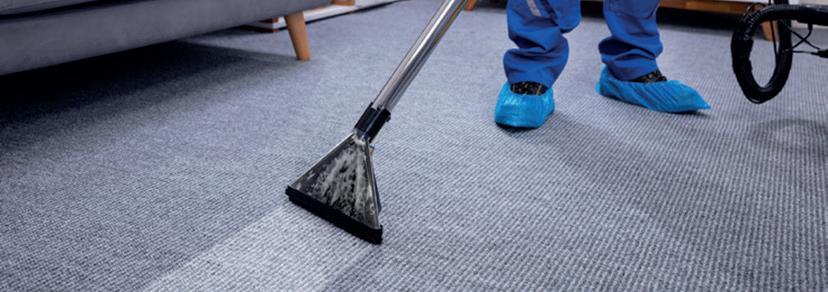

5% discount to its members. Nirav is appreciative of the community support. They also have the contract to care for veteran’s homes.
Nirav came to New Zealand from Gujarat, India in 2013, as a student studying IT. After working in the South Island, he ended up in Wellington. He and Dhruva met in India and reconnected in New Zealand. She is the smiling face in the superette.
Nirav’s team are well-known for their



prompt and e cient service. Nirav is a certi ed carpet cleaner and especially enjoys this work. He also o ers 10% discount to senior citizens and stresses all his sta are background checked and cleared.
Best way to contact this highly varied and skilled group is by:
Phone 0800 826 469
Email: nirav.shastri@wesortit.co.nz or check out the website wesortit.co.nz






































Don’t skip the small stuff
 Midweek Musings
Tim Nelson
Midweek Musings
Tim Nelson
For pretty much anything we want in life, we know what we need to do to get it. For some things, what needs to be done is relatively simple –whereas, for others, the steps will be very challenging. But, within reason, there will be a pathway there.
An example might be running a marathon. This is a significant challenge – but, from almost any starting point, for almost anyone, it can be done. I remember a news article about a man from India who ran a marathon when he was 100 years old. He didn’t start running until he was 89, doing so in grief after the death of his son.
I have a challenge that is a significant one. I have set myself a target of six months to achieve it. The first thing I am doing after setting the goal is to work out what I need to do to achieve it, then to implement the steps to get there. It won’t be
easy, but I know I can do it – I simply need to do what needs to be done.
Don’t put o the small tasks
I was recently booked on a flight to Christchurch. Days before, I was sent a text message to do the very easy online booking process – but didn’t do so until I arrived at the airport. By this stage, it was too late. When I tried to check in manually, I was told I had missed the cutoff and would have to take a later flight, which meant a fee and a delay. I could blame the airline for this, as it was incredibly frustrating and annoying – but the only person to blame is myself. We often procrastinate and don’t take care of simple tasks, leading to them becoming significant [and costly] problems.
I remember reading about the idea of doing tasks that are easy and short as soon as they come your way, or at
least shortly afterwards, perhaps in a scheduled period of time. Doing so will potentially save you a lot of frustration later on.
Turning bad into good
I missed the Christchurch flight because I didn’t check in early enough.
I missed the deadline by seconds, which was incredibly frustrating, and also annoyed my daughter who was with me. Instead of waiting four hours for the next flight, my daughter left while I waited at the airport.
Rather than sit around frustrated and annoyed, I decided to make the most of the time until my new flight departed. I just so happen to enjoy airports. There are cafés, bookshops, good wifi, comfortable seats, and they’re warm or cool, depending on the weather outside.
I went to a café and ordered a coffee, which I drank while reading the newspaper. I then went to the very good airport bookshop to browse and buy a book. Following this, I had brunch while reading,
then contacted a friend for a catch-up.
Life certainly can have its frustrations, but we often do have the ability to turn bad into good. My morning was a very nice one after all … and my daughter returned and told me she had a nice breakfast in town with friends.
Talking
I recently caught up with a friend who I hadn’t seen for quite some time – apart from occasionally running into him at the
supermarket, where we’d have a quick chat then head off on our own way. This time was quite different: He came to my house where we talked [and played a few games of chess] for almost four hours. The time just flew by as we caught up on each other’s lives. It was hard to believe that, when I checked my watch, so much time had gone by.


Fares for under 25s are changing.
Starting 1 May 2024
The government has made the decision to withdraw the government funding for the age-based concessions that have been in place since 1 September 2023. As a result, the following fares and concessions will apply from 1 May 2024:
5-16 years old (or older if still in secondary school)
50% off adult fare applies on the Green Snapper card.
17-24 years old
Full adult fare applies on the Red Snapper card unless you qualify for other concessions such as the Tertiary Concession or Community Connect Concession.
Te Hunga Whaikaha Total Mobility - 5–18-year-olds (or older if still in secondary school)
50% off adult fares applies through the Accessible Concession. Use your Te Hunga Whaikaha Total Mobility card only to travel with your carer.
Rest of concessions
The rest of the other concessions do not change, you do not need to take any action.
For affected groups, top up your Snapper card or find your best fare at metlink.org.nz/findmyfare
Try the latest hearing aids on the market, that adapt to your listening environment like never before.
They:
• monitor active conversation and then prioritise speech.
• use sensors to detect your physical movement, to understand the type of communication situation you are in, one-on-one or in a group.
Try them for yourself with a no-obligation trial at Hearing Consultants, your local Independent clinic. They really work!

Our services:
• Micro-suction of ear wax under an Operating Microscope
• Full audiology diagnostic assessment
• A complete range of hearing aid brands, that will best suit your needs and requirements.
• Tinnitus assessments
• Hearing aid repairs
• Hearing aid consumables/ batteries/ear moulds
Start where you are, and do what you can
Talking is such a valuable thing to do: Sharing ideas, troubles, laughter, life updates, and really just getting to know people a little better than we thought we did.
Kindness
Last week, I visited Kim’s Way, a short-term homeless shelter being set up in Masterton. There are many people involved in the project, led by Lyn Tankersley, with support from Stella Lennox. When Lyn and Stella showed us around, something that became very clear was the amount of community support and kindness behind the project. For example, a huge amount of labour and material has been supplied for free or at cost.
I love this level of support and kindness. It’s even more special when it’s done for no other reason than supporting the most vulnerable in our community. A comment that Lyn made pretty much summed up what I saw. She does this sort of thing because her parents once told her to love everyone, and that’s what she does.
Coping with challenge
didn’t want to hear, our staff and board of trustees were straight into working on plans and strategies to make the best of the situation we are in. It reminds me of the quote from tennis great and humanitarian Arthur Ashe: “Start where you are, use what you have, do what you can.”
To me, these are truly inspirational words and a reminder that when things don’t work out as we plan, there is always a way forward.
Don’t give up I’m reading the latest Orphan X series about a person who sticks up for those who need the support only he can provide. In one of the early books, a new character, Joey, is introduced. She’s a young computer genius who takes care of Orphan X’s technology needs, such as breaking into secure networks to access information.

between success and never having quite got there.

Sometimes things don’t work out as we hope. This has certainly been the case with a situation that has impacted on my school recently. Decisions made by others have left us in a position that isn’t ideal. However, it’s often in times like this that we become stronger as a community, and this is what I expect to see in this case. Immediately after receiving news we
In the latest book, there’s a scene where Joey is having trouble cracking a network. In her frustration, before she actually gets in, she comments to Orphan X that she’s not actually a genius, but she does find it incredibly hard to give up on a challenge.
I loved Joey’s comment. It demonstrates the value of hard work and perseverance, and the need to keep going when things are difficult. This is a trait we can all develop. It’s within all of our power to keep going, which could be the difference
• Tim Nelson is principal of Lakeview School and author of the book Small Steps for a Happy and Purposeful Life. He endeavours to learn something new every day by reading books, listening to podcasts, and engaging with a wide range of other content.
Would you know what to do if someone is injured?












SAVILLE, LOU NEWMAN, JEREMY HAY, LIZZIE TE MARO, VICKI POLLOCK, KATH LARGE, LYNDSAY WRIGHT, DEBBIE JULIAN, GAYLENE MALCOLM, NARIDA HOOPER, ROSIE HEATON, JOSH MCPHEE, CHLOE BUTLER, ROBIN IRWIN, SALLY MCPHEE, TZARINA MCPHEE, ISAAC WHARRAM, NITA EDWARDS, TRACEY HIGGINS, ANNA ROSSITER-STEAD, LUCY COOPER, LUCY GRIFFITH, GREG LANG, TESSA MCPHEE, ISABEL MCPHEE, STEFAN MCPHEE, JANIE MCPHEE, JENNIFER HANSEN, TAHU MCPHEE, SAMANTHA FAWCETT, JACOB MCPHEE, LUCINDA BIRCH, ROB PARIS, KATE HEAD, JEN BERNING, MAUREEN ASHBY, RUTH O’BRIEN, COURTNEY LEIGHTON, ANNE MALCAHY, BERNIE ELLISON, MILLIE-ROSE EDGE, MIKARA EDGE, BRENDON CORLETT, BELLA KOSENA, JACKSON KOSENA, LEE TANNER, SHEILA BUTLER, KATE TOBIN, JOLIE FENWICK, DAISY ROBERTS, RYAN ROBERTS, JULIE GORDON, CHRISSY HOLMES, ROSEANNE SHAILER, JUST US KIDS, PONATAHI CHRISTIAN SCHOOL, BARBIE YOON, SWIMMING NZ, SWIMMING WELLINGTON, CLARE CRAWFORD, DAN BROUGHTON, SAM ROSSITER-STEAD, ROBERT ROSSITER-STEAD, SCOTT HARPHAM, RICHARD SWALLOW, RON MARK, ROY ROBINSON, MIA ROBINSON, LACHLAN MCCURDY, CARTERTON CENTRAL LIONS, CARTERTON LIONS, CARTERTON ROTARY, GREYTOWN LIONS, RED ROBINS GREYTOWN, ALMOS BOOKS, BRUSH STROKE STUDIO, CARTERTON $ MART, CARTERTON PHARMACY, CHAPELLIS PIZZERIA, CLAREVILLE BAKERY, CLAREVILLE GARDEN CENTRE, FLOORING XTRA, HEADQUARTERS, HEART OF ARTS, JOHNER WINES, KAINGA EATERY, LITTLE AFRICA, LONE STAR, LORNA POTTER, OLIVE RESTAURANT, PAPER PLUS, PERFECT PAWS, SHINE, SOUTH WAIRARAPA VETS, THE JAPANESE FOOD TRUCK, WAI ARTS HOLLOWAY, WILD OATS, WRIGHT POOLS & SPAS, ANNA BEETHAM, KELLEE MCCURDY, DARRYL MCCURDY, AMY WHARRAM, SARAH ROBINSON, RENNE EARL

 Kate Judson kate.judson@age.co.nz
Kate Judson kate.judson@age.co.nz
GNS and Canterbury University scientists have recently been digging deeper into Wairarapa for modelling systems. Researchers identified unique topography on Hapua farm through LiDAR data, including parallel ridges and ponds, Langridge said. In December GNS also










buildings, through relating motions from a particular fault.”













Landslides like those seen after the 2016 Kaikōura earthquake are problematic because they cause road closures and rocks to slide into valleys, and they dramatically



















deeper on local farm
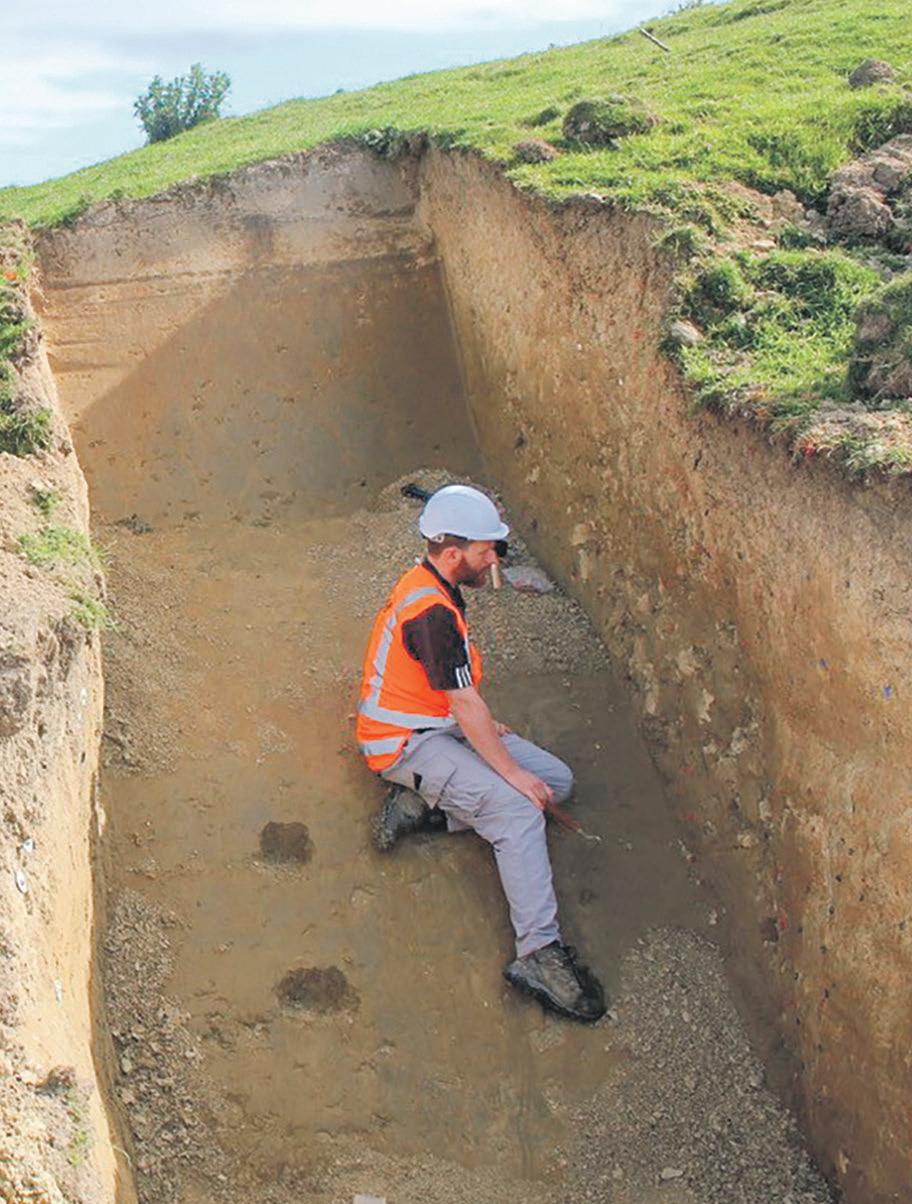

change the face of landscapes, Langridge said.
Armed with new knowledge, Langridge hopes that the community will be better prepared with what to expect with big earthquakes and landslides in the future.
He said this information can identify hazards through the modelbased system, which will influence things like the New Zealand building


With daylight savings, mornings are a bit lighter but we’re starting to really feel the chill in the evenings. It is now very much feeling like autumn.



code, regulations, and Civil Defence processes such as emergency response plans.
Langridge noted that, in conjunction with his research, scientific teams are mapping out active faults, coastal deposits, and tsunami deposits to inform seismic hazard models.
Part of this additional research includes the Hikurangi subduction zone – responsible for some of the world’s largest and
Good grazing management in early autumn is about maximising growth and utilisation. Grazing too early will reduce autumn growth/pasture recovery and grazing too late will compromise quality. Through autumn, depending on temperature, a new leaf will emerge around every 8-16 days. This correlates with a round length or 30-40 days. During May, this rotation length will be extended to allow covers to build into winter.
If cover is below where it should be to achieve targets for calving, nitrogen is a great tool to get growth back on track. Remember, nitrogen is a growth multiplier. If growth is slow, expect a smaller and longer response. A lighter rate over a larger area is best to maximise response.
Supplement to extend the round and protect residuals, strategic drying off, and exible milking options can also help build cover heading into winter.
Visit the DairyNZ website www.dairynz.co.nz for more options and tools to get winter-ready.
most powerful earthquakes and tsunamis – off the coast of Wairarapa.
“The probability for rupture of the Hikurangi subduction zone underneath us in a magnitude 8+ earthquake has a published value of 26 per cent in the next 50 years,” Langridge said.
GNS said the zone is
“potentially the largest source of earthquake and tsunami hazard in New Zealand.”
GNS is leading the majority of the Hikurangi research in a $6 million MBIE-funded project over five years, with major collaboration and contributions from international partners.
for 2026— 2029









Fire and Emergency New Zealand has opened public consultation on our proposed levies for the period 1 July 2026—30 June 2029.


Fire and Emergency is funded almost entirely through levies on eligible insurance policies. When the Fire and Emergency New Zealand Act 2017 came into effect a transitional levy funded the new organisation until the new levy arrangements, under Part 3 of the Act, could be brought in. The new levy will take effect on 1 July 2026.





Before introducing the new levy arrangements, we are required to consult on the proposed levies and the activities we plan to undertake during the levy period.
To support consultation on the levy arrangements for the period
1 July 2026—30 June 2029, a discussion document on our website sets out:
• the activities we propose to undertake over the levy period and the estimated costs of delivering these activities,
• our proposed levy rates, and
• the assumptions we have made in estimating our costs and the steps involved calculating the proposed levy rates.
We welcome submissions from levy payers, insurance policy holders, their representatives and interested members of the public on our proposals to help inform the Government’s decisions on the final levies for 2026—2029.




































































































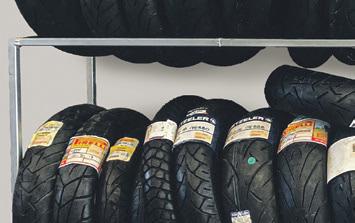
THURSDAY APRIL 11
Alcoholics Anonymous: Featherston Community Centre, 7.30-8.30pm. Call 0800 229 6757.
Belly Dance for Beginners: Kiwi Hall, Featherston, 6.30-7.30pm. Call Antonia Blincoe [021] 105-7649.
Carrington Bowling Club: 57 High Street, Carterton,1pm for 1.30pm start. Call Pauline Hodgson [027] 406-672.
Carterton Community Choir: 7.159pm, St David’s Presbyterian Church Youth Wing, 164 High St South. Call [0278] 205-801.
Carterton District Historical Society: 142 High St North, Carterton, open 2-4pm or by appointment. Call Vivienne 379-5564 or email carterton.hist.soc@gmail. com
Carterton Scout Group: Rangatahi Hub [behind Carterton Event Centre], Scouts [11-14 years] 6.30-8.30pm.
Contact Sylvia [027] 249-3395.
Danzability Class: 11am-noon, at Studio 73, Greytown. Contact physio. rachel.horwell@gmail.com or [022] 077-2654.
Digital Seniors Wairarapa: Call [0800] 373-646 to book or for advice. Martinborough: 9.30-11.30am, St Andrew’s Church; Featherston: 1.303.30pm, Featherston Community Centre. Fareham Creative Space: Also Fri/ Tues, open studio, 10am-3pm, 80 Underhill Rd, Featherston. Email: registrations@farehamcreativespace. nz Featherston Menz Shed: 61 Fitzherbert St, open from 6.30pm. Food Market: Food trucks, 4.30-7pm outside the Masterton Town Hall, rain or shine.
GirlGuidingNZ: Carterton Pippins, 5-7 years, 4.15-5.30pm. Carterton Brownies, 7-9½ years, 6-7.30pm. Call Sharon [021] 033-0550.
Justice of the Peace: Masterton CAB 9.30am-12.30pm. KeepFit!: 10.30am, Senior Citizens Hall, Cole St, Masterton. Call Age Concern [06] 377-0066.
Masterton Petanque Club: 2pm, in Queen Elizabeth Park. Call Myrna Lane 377-3064.
Friendship Force Wairarapa: Travel and cultural experiences through home hosting. Contact June Roseingrave [022] 305-9234.
Masterton Toy Library: 10am-12pm, 365 Queen St.
Narcotics Anonymous: 7.308.30pm, at St Matthew’s Church, Church St, Masterton. Parkinson’s Exercise Class: 1.30pm, at the Wairarapa Boxing Academy, Dixon St. Call Roslyn [027] 264-8623.
Patient Activity Programme: At Hospice Wairarapa, 59 Renall St, Masterton, 10am-1pm. Call 378-8888.
Pickleball: Masterton Rec Centre, 2 Dixon St, 5.30pm-7pm. All gear provided. Contact Sue [027] 449 0601.
Red Star Table Tennis Club: 5-7pm at Red Star Sports Association 10 Herbert St, Masterton. Call Peter [027] 566-4664 or Brian 377-4066.
Ruamahanga Club: Cards, 500, 1-4pm, at Wairarapa Services Club, Essex St, Masterton.
Social Learners Bridge: 1-3.30pm, Featherston Community Centre. Call Barbara [06] 304-9208.
Steady As You Go: Falls Prevention and Balance Class, 9.30am, Senior Citizens’ Hall, Cole St, Masterton. Call Age Concern [06] 377-0066. Thursday Morning Bikers: Meet at the fountain at the Queen Elizabeth Park entrance, 9.30am. Contact David [021] 246-0295.
Wairarapa Fern and Thistle Pipe Band: Weekly practice, Masterton Brass Bandrooms, Park Ave, Masterton. Email fernandthistle21@gmail.com
Wairarapa Model Aero Club: 9amnoon, at the Masterton Aerodrome. Whakaoriori Shufflers: Line dancing, Red Star clubrooms, Herbert St, Masterton, intermediate, 1-2.30pm. Call 377-5518 or 377-1135.
FRIDAY APRIL 12
Aratoi: Lester Blair: Twenty-Four Churches to Apr 16; James Bragge: Splendid Scenic Gems to May 5; Choice: Staff picks from the collection to May 5; Lisa Chandler: Landscapes of Loss to May 19; King Street Artworks to May 26.
Carterton Craft Market: Mon-Sat: 9am-4pm, Sun: 10am-3pm, 25 High St North, Carterton. Call Desley [027] 787-8558.
Carterton Senior Citizens: 12.303.30pm, play cards, Rummikub and Scrabble, at the old courthouse next to the library.
Cloth Collective Sewing Workshop: 10am-2pm, Kiwi Hall Supper Room. Call Sara Uruski [0274] 474-959. Dance Fit: At Carrington Park, Carterton, at 6-7pm. Text dance groove to [022] 321-2643.



French Conversation: U3A-affiliated group, Education Centre, Dixon St, Masterton, 11am-1pm. For people wanting to converse in or improve French. Brett [027] 363-4039 or Robyn [021] 169-9415.
Greytown Music and Movement: For pre-schoolers, 10am, at St Luke’s Hall, Main St. Contact email admin@ stlukesgreytown.co.nz
Justice of the Peace: Carterton library noon-2pm; Masterton District Court 11am-1pm; Eketahuna Library 1.30-4.30pm.
Masterton Bowling Club: Funzie Friday, 12.30pm for 1pm start. Call 377-4664 after 4pm.
Masterton Croquet Club: Golf Croquet 9.15am behind the Hosking Garden in the park. Call Russell Ward 377-4401.
Masterton Masters Swimming Club: Club night 5.30-6.30pm, Trust House Recreation Centre back pool. Call Stu [027] 295-4189 or Lucy [021] 0204-4144.
Needlework & Craft Drop-in: 10am-noon, Featherston Community Centre. Call May [06] 308-6912 or Virginia [06] 308-8392.
Wairarapa Kids Choir: For children aged seven years up, 3.50-4.50pm, during school terms, Courthouse, Holloway St, Carterton. Call Jill [027] 347-5891.
Wairarapa Stop Smoking Service: Quit Clinic at Whaiora 9am-noon. Support across Wairarapa. Call Whaiora 0800 494 246. Walk and Talk: Meet outside Dish Cafe, First St, Masterton, 9.30am.
SATURDAY APRIL 13
Carrington Bowling Club: 57 High St, Carterton, behind clock tower. Call Pauline [027] 406-6728.
Cobblestones Early Settlers Village: Open 10am-4pm seven days.
Crop Up Greytown: Fresh produce, seafood and kitchen creations from Greytown and South Wairarapa, from 9am, at Truckstop Greytown, 102 Main St. Check Facebook.
Featherston Heritage Museum: Behind the Featherston Library and Information Centre. Sat/Sun 10am2pm, other times by arrangement. Call Elsa [021] 263-9403.
Featherston Weekly Market: 8am2pm, 33 Fitzherbert St. Greytown Menz Shed: 9am-noon. Call Paul Dodge [021] 0262-6595.
Justice of the Peace: Service centre available at Masterton Library, 10am-noon. Lions Book Sale: 9am-1pm, under the grandstand, Solway Showgrounds, Judds Rd, Masterton. Martinborough Men’s Shed: Old Courthouse, 20 Cork St, 9am-noon. Call John [021] 314-2485.
Martinborough Museum: Open Sat/Sun at No 7 The Square, 10.30am2.30pm. Donation/koha appreciated.
Masterton Croquet Club: Association Croquet 9.15am and 12.45pm behind Hosking Garden in the park. Call Carl Redvers 378-7109.
Masterton Tennis Centre: Organised doubles from 12.30 pm at 147 Dixon St, Masterton. Sue McRae [027] 449-0601. Parkrun: Weekly 5km run/walk. 8am start, at the Woodside end of the Greytown rail trail. Info: parkrun. co.nz/greytownwoodsidetrail
Tinui Craft Corner and Museum: Open Sat/Sun 10am-4pm. Call Lesley Hodgins [06] 372-6433.
Toy Library: Masterton: 10am12pm, 365 Queen St. Featherston: 14 Wakefield St, 10am-noon. Wairarapa Cancer Society
Supportive Care Services: For anyone needing support after a cancer diagnosis. Call (06) 378-8039. Wairarapa Farmers’ Market: 9am1pm, Solway Showgrounds, Judds Rd, Masterton. Women’s Self Defence: With Dion, 9am, band rotunda, Queen Elizabeth Park. Call [020] 4124-4098.
Wairarapa Embroiderers Guild: At the Ranfurly Club Rooms, Chapel St, Masterton. Email
Wairarapaembroiderers@gmail.com
SUNDAY APRIL 14
Carterton Farmers’ Market: High St, Carterton, 9am-12.30pm.
Featherston Menz Shed: 61
Fitzherbert St, open from 1pm.
Masterton Marauders Wargaming Club: Masterton Croquet Club, 1-5pm. Vince Cholewa [027] 344-1073 or visit http://
mastertonmarauders.blogspot.co.nz
Masterton Park Bowling Club: Queen Elizabeth Park, bowls roll up at 1pm, names in by 12.45pm. Call [027] 957-1012.
Masterton Petanque Club: Club day 2pm, in Queen Elizabeth Park. Call Myrna Lane 377-3064.
Anonymous: Featherston Community Centre, 7-9pm. Call 0800 628 632.










Hospice Wairarapa Support Services: For anyone dealing with a terminal illness. Call [06] 378-8888.
Housie: 7pm, Club Carterton, Broadway. Call 379-8069.
Justice of the Peace: Masterton CAB, Perry St, 9.30am-12.30pm.
Keep Fit!: 9.30am, Senior Citizens’ Hall, Cole St, Masterton. Call Age Concern [06] 377-0066.
Line Dancing: 10.30am, Senior Citizens’ Hall, Cole St Masterton. Call Age Concern [06] 377-0066.
Literacy Aotearoa: Free computing and digital device classes for adults. Call 377-4214.
Mah-jong: 1-4pm, Featherston Community Centre. Call Pat Hamilton [06] 308-9729.
Masterton District Brass Band: Rehearsals at 7pm, Band Room, Park Ave, Masterton. Call [022] 574-0742.
Masterton Food Bank: 9 Church St, Mon-Fri 10am-12.30pm. Call 370-8034.
Play Gym: St James Church Hall 116 High St, Masterton, 9.30-11am, for 0-3-year-olds.
Red Star Table Tennis Club: 6-8pm at Red Star Sports Association 10 Herbert St, Masterton. Call Peter [027] 566-4664 or Brian 377-4066.
Senior Citizens Club: Cards 1-4pm, Featherston Community Centre. Call Val [06] 308-9293.
Steady As You Go: Falls Prevention and Balance Class, Featherston: 9.30am, A/G Church. Masterton: 1.30pm, Senior Citizens’ Hall, Cole St. Call Age Concern [06] 377-0066. The Dance Shed: 450A Belvedere Rd, Carterton. Beginners Linedance Class: 6-7pm. Linedance Intermediate Class: 7.30-8.30pm. Call Wendy [027] 319-9814.
Troubadour Music Group: 6-8pm, Wairarapa Community Centre, 41 Perry St, Masterton. Contact Stefan [027] 226-6019.
Wairarapa Futsal: 6pm Clareville Showgrounds. Call Robyn [027] 235-8673. Wairarapa Services Club: Cards, 500, 1.30pm, at the club, Essex St, Masterton. Wairarapa Stop Smoking Service: Call a Quit Coach based at Whaiora 0800 494 246.
TUESDAY APRIL 16
Caregivers Programme: Caring for your loved one who is unwell, at Hospice Wairarapa, 59 Renall St, Masterton. Call Kirsten 399-1050.
Carrington Bowling Club: 57 High St, Carterton, behind clock tower. Call Pauline [027] 406-6728. Carterton District Historical Society: 142 High St North, Carterton, open 2-4pm or by appointment. Call Vivienne 379-5564. Central Indoor Bowls Club: 7.30pm, Hogg Crescent hall. Call Mathew or Graeme 378-7554.
Chair Exercise: Gentle chair exercises, 2-2.45pm, at St John’s Hall, Greytown.
Clareville Badminton Club: Main Stadium at Clareville, 7.30pm -9pm. Call Steve [027] 333-3975.
Dance Fitness: 6.30-7.30pm, at Fareham House Hall Featherston. Call Justine [0204] 105-2830.
Digital Seniors Wairarapa: Call [0800] 373-646 to book or for advice. Carterton: 9.30-11.30am, Carterton Library; Greytown: 1.30-3.30pm, Greytown Library.
Featherston Amateur Wrestling Club: During school terms. Classes are weight and skill dependent; Beginners, 5-9 years, 5.30-6.15pm; 10 years+ [including adults] 6.157.30pm.
Featherston Menz Shed: 61 Fitzherbert St, open from 10am.
Featherston Toy Library:
Featherston Community Centre, 9-11am.
Featherston Wahine Singers: 7-8.30pm, Featherston Community Centre. Call Susan [021] 246-4884. Free Literacy and Numeracy Classes: At Literacy Aotearoa, 340 Queen St, Masterton. Call Carol [022] 524-5994.
GirlGuiding: Masterton Pippins [5-7 years] 3.45-5pm. Call Chrissy Warnock 372-7646.
Justice of the Peace: Masterton CAB 11am-1pm.
Knit and Natter: 3pm, Wairarapa Community Centre, Perry St; 7pm, Te Awhina Cameron Community House, 2 Stuart Cres, Masterton. Mah-jong: Carterton Memorial Club, Broadway, 1pm. Call Faye [021] 1606637.
Masterton Alcoholics Anonymous: 7.30pm, St Matthew’s Church Hall, 35 Church St. Call Anne 378-2338 or David [021] 116-5505.
Masterton Croquet Club: Golf Croquet 9.15am behind the Hosking Garden in the park. Call Russell Ward 377-4401.
Masterton Judo Club: Tues/Thurs, youth class 5-6pm, adults 7-8.30pm, Nga Totara Dojo, 205 Ngaumutawa Rd, Masterton. Contact Simon [021] 248-6111.
Masterton Senior Citizens and Beneficiaries Association: Social indoor bowls, 500 cards, or a chat 1-3pm, Senior Citizens hall, Cole St. Call Ngaire 377-0342.
Masterton Toy Library: 10am12pm, 365 Queen St, Masterton. [021]0716634.
Red Star Table Tennis Club: 9amnoon at Red Star Sports Association 10 Herbert St, Masterton. Call Peter [027] 566-4664 or Brian 377-4066.
Scallyrag Border Morris Dancing: 7-8 pm at the Auditorium, Kuranui College, Greytown. Contact Alison [021] 111-1894. Social Bridge: At South Wairarapa Workingmen’s Club, 1.30-3.30pm. Call Lesley [021] 299-6389.
South Wairarapa Badminton Club: Featherston Sports Stadium, Underhill Rd, 7pm-9pm. Rackets available.
South Wairarapa Workingmen’s Club: Games afternoon. Call Doff 304-9748.
Wairarapa Embroiderers Guild: Meet at the Ranfurly Club Rooms, Chapel St, Masterton. Email Wairarapaembroiderers@gmail.com
Wairarapa Herb Society: Old Court House, Holloway St, Carterton, 1.303pm. Calendula herb of the month, bring pottle for balm sample. FREE. Contact waiherbs@gmail.com
Wairarapa Modern Jive: Carterton School hall, 7.15-7.30pm Intermediate workshop; 8-8.45pm Beginners class. Contact Lance [021] 134-5661.
Wairarapa Services Club: Cards, Euchre, 1pm, at the club, Essex St, Masterton.
Wairarapa Spinners & Weavers: 7pm, The Wool Shed, Dixon St, Masterton. Call Trish 378-8775 or Josie 378-6531.
Wairarapa Toastmasters: Meet fortnightly, Salvation Army Hall, 210 High St, Carterton, 7.30pm. Wayne [027] 335-5825.
Woops A Daisies: Leisure Marching Team practice 4-5pm, Trust House Rec Centre Stadium. Call Cheryl [06] 370-1922 or [027] 697-6974.

WEDNESDAY APRIL 17
AA Meeting: At 7.30pm, Epiphany
church hall, High St, Solway, Masterton. Call [027] 557-7928. Athletics Wairarapa: Club night, 5.45-7pm, Colin Pugh Sports Bowl, Masterton. Cards: “500”, 1.15-4.15pm, at the Carterton Club. Call Barbara 379-6582 or Val 379-8329.
Carterton Cycle Group: From Belvedere Rd [weather permitting]. Call Irene [027] 634-9167 or Lesley [021] 299-6389.
Dance Fitness: 9.30-11am, preschoolers with parents or caregivers at Fareham House Hall Featherston. Call Justine [0204] 105-2830.
Digital Seniors Wairarapa: Call [0800] 373-646 to book or for advice.
Masterton: 10am-noon, Masterton Library. Free Classes: Literacy, language, numeracy for adult learners. Call Literacy Aotearoa 377-4214.
GirlGuidingNZ: Masterton Brownies, 7-9½ years, 5.30-7pm. Call Sharon [021] 033-0550.
Greytown Menz Shed: 9am-noon. Call Paul Dodge [021] 0262-6595. Healing Rooms: Confidential prayer for healing or any situation, 2-4pm, at St Matthews Church Hall, Church St, Masterton. Call [027] 245-2819.
Heart of Arts Wairarapa: Community gallery, 47 High St North, Carterton, Wed-Fri, 10am-4pm, weekends, 10am-2pm.
Juesday Art: 10am-12.30pm, AOG Church, Birdwood St, Featherston. Call Julia [06] 308-8109.
Justice of the Peace: Masterton CAB, Perry St, noon-2pm.
Kiddie Gym: For under-5s, 9.3011am, at St David’s Church, corner High and Victoria Sts, Carterton. Call Judy or Joan 379-8325.
Martinborough Men’s Shed: Old Courthouse, 20 Cork St, 9am-noon. Call Doug [027] 444-7331.
Masterton Art Club: 10am-2pm, also print on Fridays, at 12 Victoria St. Call Elissa [0274] 706-528.
Masterton Croquet Club: Association Croquet 9.15am and 12.45pm behind the Hosking Garden in the park. Call Carl Redvers 378-7109.
Masterton Park Bowling Club: Queen Elizabeth Park, 1pm, names in by 12.45pm. Call [027] 957-1012.
Men’s Group: Meet for support and friendship at Salvation Army Village, Ngaumutawa Rd, Masterton, 7-9pm.
Parkinson’s Singing Group: 10am, at the South Wairarapa Workingman’s Club, Main St, Greytown. Call Marguerite Chadwick 379-5376. Pickleball: Masterton Rec Centre, 2 Dixon St, 9.30am-11am. Gear
provided. Contact Sue [027] 449 0601.
Rangatahi to Rangatira Youth Group: Sports, food, and leadership, Carterton Events Centre. Text “R2R” to [027] 742-2264.
Recreational Walking Group: 9.30am, Essex St car park. Call Ann Jackson, 372-5758, or Ann Duckett, 378-8285.
Scrabble Club: 1-4pm in Masterton. For venue details, call Sue McRae [027] 449-0601.
Silver Ukulele Club: 1-3pm, Featherston Community Centre. Call Jan [06] 308-8556.
Soulway Cooking and Crafts: 10am-noon, High St, Masterton. Call Nikki Smith 370-1604].
South Wairarapa Caregivers
Programme: Caring for your loved one who is unwell, at a café in South Wairarapa. Call Kirsten 399-1050.
Taoist Tai Chi: From 5.30pm at St
Mark’s Church Hall, 185 High St, Carterton. Contact www.taoisttaichi.
org Te Runga Scouts: Cubs, 6-7.30pm, 45 Harley St, Masterton.
The Dance Shed: 450A Belvedere Rd, Carterton. Line Dance Class 6-7pm; Rock N Roll Dance Class: 7.308.30pm, Beginners/Couple Coaching, Social/Competitive. Call Wendy [027] 319-9814.
Toi Wairarapa – Heart of Arts: Main St, Carterton 10 Minute Bites, 12.10pm, BYO sandwich.
Wairarapa Rockers: Rock’n’roll. Couple inquiries to [027] 333-1793.
Wairarapa Services Club: Rummikub, 1pm, at the club, Essex St, Masterton. Wairarapa Singers: Choral singing. Call Graeme
Events



Hairdresser
Hairdressing
Mobile Services
Hair 2 U
Renee Whitcombe
Enjoy getting your hair done in your own home
Great Rates!
Try me now!
Ph 06 377 1617 or 027 246 1617
Firewood


FIREWOODSUPPLIES.CO.NZ 06 306 9110
GUM 4m3 $720, 2m3 $420
DOUGLAS-FIR 4m3 $710, 2m3 $410
MACROCARPA 4m3 $710, 2m3 $410
SPLIT PINE 4m3 $600, 2m3 $350
BAGGED KINDLING $17each
COMBO’S (2M3 X 2= 4M3)
GUM & D/FIR $740 GUM & MAC $740
GUM & S/PINE $680 D/FIR & MAC $730
D/FIR & S/PINE $670 MAC & S/PINE $670
Delivery & GST included, Winz Approved


Sports Notices

SENIOR FOOTBALL PLAYERS
Are you wanting to play senior men s football and think it is too late to join a team?
Masterton A F C have a few spaces left in their teams playing in the 2 nd/3rd division local league.
If you are interested phone
Charlie 0272 325 340 Brendon 0210 607 770 Gary 0211 096 711
For Sale

Opening Hours: Tues, Wed, Thurs 7:30 - 5pm
For all your iron and roo ng needs call











HO MEW OOD D CLAYBIRD SHHOOT

COLLECTIVE Catchments Partnership Lead
The Wairarapa Catchment Collective is looking for a Partnership Lead to support our growing network of catchment groups in t he Wairarapa. The role is a part -time fixed term contract.
The role involves facilitating the development and implementation of catchment action plans, connecting groups with services, resources and learning opportunities and promoting the project and cat chment group stories.
The ideal candidate should have facilitation experience, be self-motivated, an effective communicator, have high computer literacy, analytical and problem-solving skills, interest in the rural sector, and experience working with community groups
View a copy of the job description at bit.ly/WCC-Partnership. To apply, send a cover letter and CV to wccjobrecruitment@gmail.com
Applications close 5.00pm, 19 April 2024.
WAIRARAPA

The purpose of the ro le is to develop and manage the implementation of the project plan, budgets, resourcing and reporting, and pursue funding opportunities
The ideal candidate should have strong project management, leadership, communication, problem-solving, conflict management and negotiation skills
Experience working with the rural sector and community groups is preferred
View a copy of the job description at bit.ly/WCC-Project To apply, send a cover letter and CV to wccjobrecruitment@gmail.com.
Local couple win regional award
A Masterton sheep and beef farming couple have been crowned the Regional Supreme Winners of the Greater Wellington Ballance Farm Environment Awards.
The recipients, Andy and Gemma Phillips, started work on the Motumatai farm 14 years ago.
The duo purchased Motumatai – which had been in Gemma’s family since 1914 – in 2017 with a strategy for lifting livestock production and enhancing the natural beauty of the landscape.
At a ceremony on Wednesday, the judges noted the Phillips have established a business excelling in every aspect of sustainability.
“Their farm systems are carefully aligned with the diverse physical resources available, and they prioritise continual improvement in environmental sustainability,” the judges said.
“Central to their business ethos is a distinctive approach to involving people for mutually beneficial outcomes, along with a dedication to mentoring and contributing to the


community, catchment, and industry.
“Additionally, the business demonstrates strong financial performance when benchmarked against comparable enterprises.
“This enables further investment in on-farm projects, expansion of the nursery, and the creation of future opportunities for both the family and the farm team.”
The Phillips also lease three other properties,
bringing their total farming area to 1365ha [1185ha effective].
Their sheep and beef breeding and finishing operation runs an estimated 500 cattle and 6500 sheep.
The pair use a combination of financial and environmental sustainability values on the farm.
They also have a strong focus on people in order to cultivate an inclusive and supportive environment, and mentor new staff to support them toward owning their own businesses.

Fine food & music
The Runholder welcomes The New Zealand String Quartet for a special three-course
dinner & concert.
Friday 26th April | $110pp Transportation available from Martinborough, Greytown or Featherston Book your ticket via iTICKET.co.nz
Also noted by the judges is the way the Phillips carefully manage their soil and pastures, actively control pests and predators, and protect waterways with substantial fencing.
The couple – in conjunction with two other Wairarapa families - have also established a commercial native plant nursery, Piwakawaka Plants, with many of the trees grown there planted at Motumatai.
Thanks to the couple having planted trees on the property over many years, there are now significant
Wairarapa Police Area Commander Inspector Scott Miller is retiring after 40 years on the force. PHOTO/FILE

areas of established native habitats.
In addition to winning the supreme regional award, the Phillips also won the Bayleys People in Primary Sector Award, the Beef + Lamb New Zealand Livestock Farm Award, and the NZFET Climate Recognition Award.
The supreme winner from each of the eleven regions involved in the awards will be considered for the Gordon Stephenson Trophy at the Trust’s National Showcase in Hamilton in June.
The recipients of the Gordon Stephenson


Council farewells area commander
Wairarapa Police Area Commander Inspector Scott Miller, who retires later this month, was farewelled by Masterton District Council at its meeting on Wednesday. His retirement comes as he reaches his fortieth year on the force, having joined New Zealand Police on April 16, 1984.
Miller officially took up the role of the region’s area commander in 2018, having been appointed Acting Area Commander the year before.
Although he’d spent the majority of his policing career in Wellington, he’d previously served as head of the region’s Criminal Investigation Branch [CIB] – which is dedicated to investigating and solving serious crime and targeting organised crime and
Trophy will become the National Ambassadors for Sustainable Farming and Growing for 2024.
Other Greater Wellington Ballance Farm Environment Award winners were: Jason Christensen from Fernhill, Masterton, who was awarded the DairyNZ Sustainability and Stewardship Award, and the Greater Wellington Regional Council Award; Scott and Ana Gudsell of the Ngahau Trust at Pirinoa, who took home the Norwood Farming Efficiency Award; Stan and Jenny Braaksma of Motuiti, Masterton, who won the Greater Wellington BFEA Lifestyle Award; John and Nancy Keating of Domus Arborum, Carterton, who were highly commended in the Greater Wellington BFEA Lifestyle category; Harry, Tim, and Kate Gibbs of Stanmore Farm, Te Horo, who took out the Ballance Agri-Nutrients Soil Management Award, the Hill Labs Agri-Science Award, and the Rabobank Agri-Business Management Award; Michael Grace, and Guy and Carolyn Parkinson if Terawhiti Station, Makara, who received the NZFET Innovation Award, and the NZFET Biodiversity Award.





recidivist criminals – from 2013-2015. He’d also spent four months stationed in Masterton to help protect local officers and residents during the Nomad gang firebombing campaign that targeted police houses in the region in 1988.
Masterton Mayor Gary Caffell paid tribute to Miller at the council meeting, noting that it was to his “credit that he has built strong relationships across the region with iwi, mayors, councils, members of parliament and community groups”. His input while representing police on several governance working groups tasked with addressing issues such as family harm and disadvantaged community members “has been hugely significant”, Caffell said, who credited the recent establishment of

the Wairarapa Youth Governance Oversight Group to Miller’s forthright approach.
“For me, that group typifies perfectly the huge impact Scott has had on our community,” Caffell said, “not just as a powerfullooking man wearing a blue uniform with a few stripes on but as someone who really cares about people, especially those who are being disadvantaged by circumstances often beyond their control.
“Yes, the police will miss your leadership and passion, but even more so our community will miss the wonderful empathy and care you have shown towards so many of our people.”
• The Times-Age will publish an exit interview with Miller that canvasses his many years of service once he has officially retired.






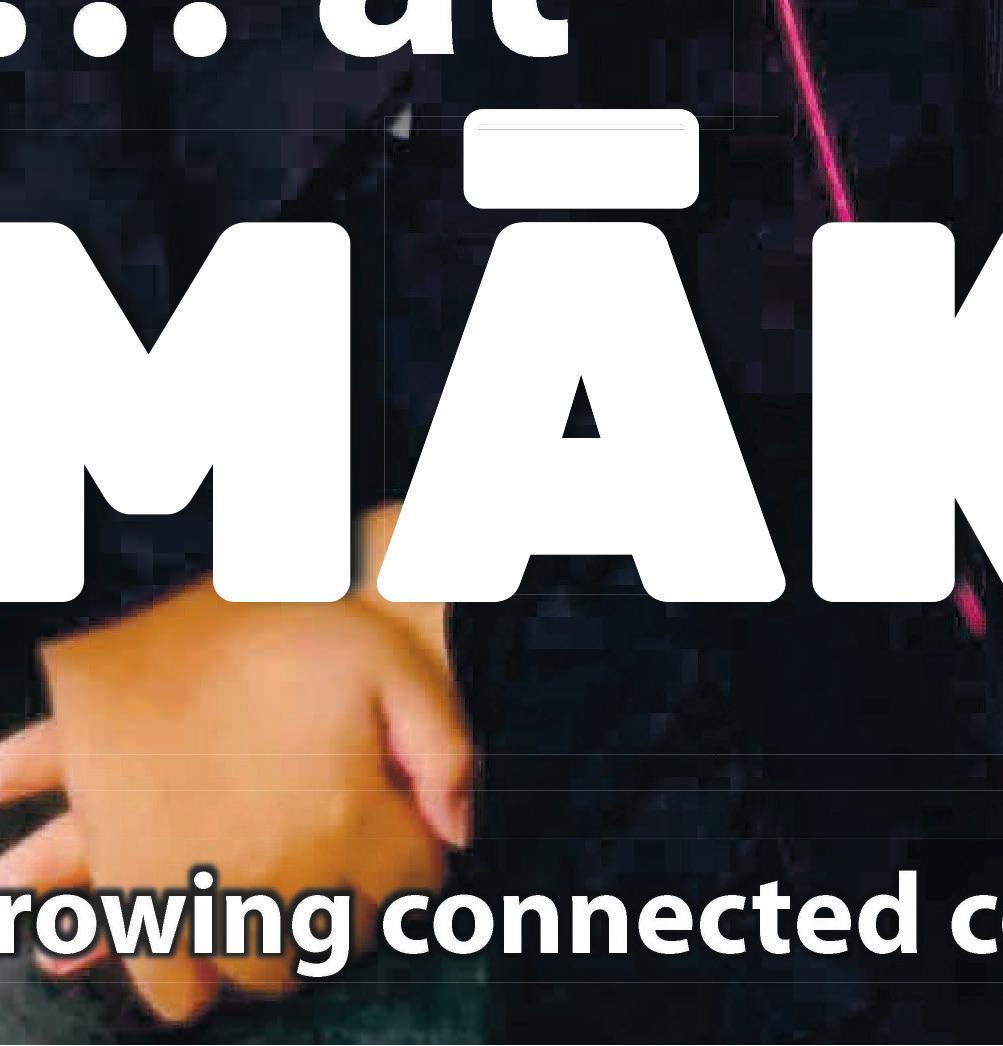
We have limited places for all year levels from Term 2 onwards
We have high expectations of our students to achieve their very best

We have the smallest class sizes and amazing NCEA results
We have engaging curriculum, cultural, and sporting opportunities

We supply a chromebook, stationery, and a school blazer.













